#while trans people are under attack
Text
slur discourse is the funniest fucking thing to me like. why are we debating who is allowed to say tranny? shouldn't we be trying to figure out how to get said trannies human rights?
#ace speaks#trans people are gonna be the next to lose their rights in the usa#we need to do something#I won't sit here and listen to y'all argue about slurs#while trans people are under attack#there are people getting killed#and y'all want to debate about slurs?
8 notes
·
View notes
Text
this is probably going to be long
OK, I lived through the AIDS crisis. I was a young person questioning my sexuality at arguably the worst possible time in American history. I discovered the word "bisexual" (hooray I have a label) only to read a few days later in mainstream news about how "bisexuals were responsible for spreading AIDS to the hetero community" which was a take that was tolerated on national news shows at the time. The only sex education I had in my entire public education was a film we were forced to watch about how you could get AIDS from french kissing (you can't) and heavy petting (which we didn't know what it was because it was outdated old people code for oral lol)...
The entire LGBTQIA plus community was not attacked as a monolith, the focus of hate came on gay men, because they were the most obviously effected and also the most visible and prominent in the community. The rest of the community did their best to embrace and protect them. (For example lesbian groups that were on the front lines of caring for people who were sick when no one else would...).
And there were people like myself who identified as allies but were in a place where they didn't feel safe to come out themselves. I did not come out at that time because even though I was in accepting local community at University and working at a feminist journal I knew I would lose friends and family and possibly future work opportunities. Being Bi it was easier to blend in for me and I took advantage of that. Part of the reason I hesitated so long about coming out was I felt a lot of guilt that I didn't come out in the 90s during the AIDS crisis. I felt like a coward who wasn't worthy to stand with such brave people.
It took me a long time to let go of that self-hate to the point where I could come out. A big part of it was acknowledging how fucked up the climate for LGBTQIA folks in the 80s and 90s. We had two family friends (which is how I knew I would probably be rejected by a lot of my family) who died of AIDS. Yes, these were brilliant, creative men who worked in theater. One of them was the props coordinator for Late Night with David Letterman (responsible for building Dave's velcro suit etc.). I also have a peer who died of AIDS in the early 2000s, long after the disease had supposedly been "not a death sentence" who also happened to be an actor.
Despite their lack of political involvement, they were be seen as radical just because they lived openly as gay men in a society that hated them and wanted them dead, and only tolerated them if they were the "fun gays" who weren't actually threatening the status quo...
Being in theater or the arts was a survival tactic for a lot of people ya know because it was a more accepting environment and because it wasn't considered important like politics, medicine, science etc. (Miss me with the gays can't do math jokes. A gay man invented the fucking computer).
The gay men I knew in long-term monogamous relationships survived the worst of the crisis and they automatically became "respectability queers" for having not died and wanting jobs with health insurance etc. Because one dude follows his dream of working in theater and the other quits theater and goes to work at the phone company and buys a house with his partner, one is fun and the other boring? One is a creative genius creating culture and the other is a consumer of cultural pap? Wow. Great take.
FUCK. I'm just getting so angry thinking about this. You want to know why it took me till I was FIFTY fucking years old to come out: AIDS. That's it. ONE Fucking word.
Sorry I have no idea WHY I fucking started this other than I saw a shitty post that said, our culture became boring because all the fun gays died and left only the boring gays who only care about marriage or whatever.
#Also: what the fuck is wrong with CATS and ghostbusters???#both are great#both have their value#if you want to bitch about marvel or shitty broadway musicals then do it#please don't throw all the old gays under the bus for being boring while you do it#also there was that post yesterday about Anthony Perkins and I did not realize he died of AIDS#I don't know how I missed it...oh it happened in 1992 when I wasn't living at home and didn't have a tv...#sometimes the sex positive bubble of tumblr will prefer the LOLZ lifetime achievment of fucking take#over the he was conflicted because all of society hated him for being gay and many many shitty people rejoiced I'm sure when he died take#as they did when other prominent gay men died of AIDS#PS: those are the same people trying to pass legislation attacking trans people#the same fucking people
28 notes
·
View notes
Text
So a few months ago there was the discourse about would you rather meet a man or a bear in the woods. I didn't want to touch it while the discourse was hot and everyone dug in hard because those are not good conditions for nuance, but I waited until today, June 1st, for a specific reason.
I'm not going to take a position in the bear vs man debate because I don't think it matters. What is really being asked here is how afraid are you of men? Specifically, unexpected men who are, perhaps, strange.
People have a lot of very real fear of men that comes from a lot of very real places. Back when I was first transitioning in 2015 and 2016, I decided to start presenting as a woman in public even though I did not pass in the slightest.
I live in a red state. I knew other trans women who had been attacked by men, raped by men. I knew I was taking a risk by putting myself out there. I was the only visibly trans person in the area of campus I frequented, and people made sure I never forgot that. Most were harmless enough and the worst I got from them was curious stares. Others were more aggressive, even the occasional threat. I had to avoid public bathrooms, of course, and always be aware of my surroundings.
I know how frightening it is to be alone at night while a pair of men are following behind you and not knowing if they are just going in the same direction or if they want to start something - made all the worse for the constant low level threat I had been living under for over a year by just being visibly trans in a place where many are openly hostile to queer people. You have to remember, this was at the height of the first wave of bathroom law discussions, a lot of people were very angry about trans women in particular. My daily life was terrifying at times. I was never the subject of direct violence, but I knew trans women who had been.
I want you to keep all that in mind.
So man or bear is really the question "how afraid of men are you?", and the question that logically follows is "What if there was a strange man at night in a deserted parking lot?" or "What if you were alone in an elevator with a man?" or "What if you met a strange man in the woman's bathroom?"
My state recently passed an anti trans bathroom bill. The rhetoric they used was about protecting women and children from "strange men", aka trans women.
Conservatives hijack fear for their bigoted agenda.
When I first started presenting as a woman the campus apartment complex was designed for young families. The buildings were in a large square with playgrounds in the center, and there were often children playing. I quickly noticed that when I took my daughter out to play, often several children would immediately stop what they were doing and run back inside. It didn't take me long to confirm that the parents were so afraid of "the strange man who wears skirts" that their children were under strict instructions to literally run away as soon as they saw me.
"How afraid are you of a strange man being near your children?"
I mentioned above that I had to avoid public bathrooms. This was not because of men. It was because of women who were so afraid of random men that they might get violent or call someone like the police to be violent for them if I ever accidentally presented myself in a way that could be interpreted as threatening, when my mere presence could be seen as a threat. If I was in the library studying and I realized that it was just me and one other woman I would get up and leave because she might decide that stranger danger was happening.
Your fear is real. Your fear might even come from lived experiences. None of that prevents the fact that your fear can be violent. Women's fear of men is one of the driving forces of transmisogyny because it is so easy to hijack. And it isn't just trans women. Other trans people experience this, and other queer people too. Racial minorities, homeless people, neurodivergent people, disabled people.
When you uncritically engage with questions like man or bear, when you uncritically validate a culture of reactive fear, you are paving the way for conservatives and bigots to push their agenda. And that is why I waited until pride month. You cannot engage and contribute to the culture of reactive fear without contributing to queerphobia of all varieties. The sensationalist culture of reactive fear is a serious queer issue, and everyone just forgot that for a week as they argued over man or bear. I'm not saying that "man" is the right answer. I am saying that uncritically engaging with such obvious click bait trading on reactive fear is a problem. Everyone fucked up.
It is not a moral failing to experience fear, but it is a moral responsibility to keep a handle on that fear and know how it might harm others.
19K notes
·
View notes
Text
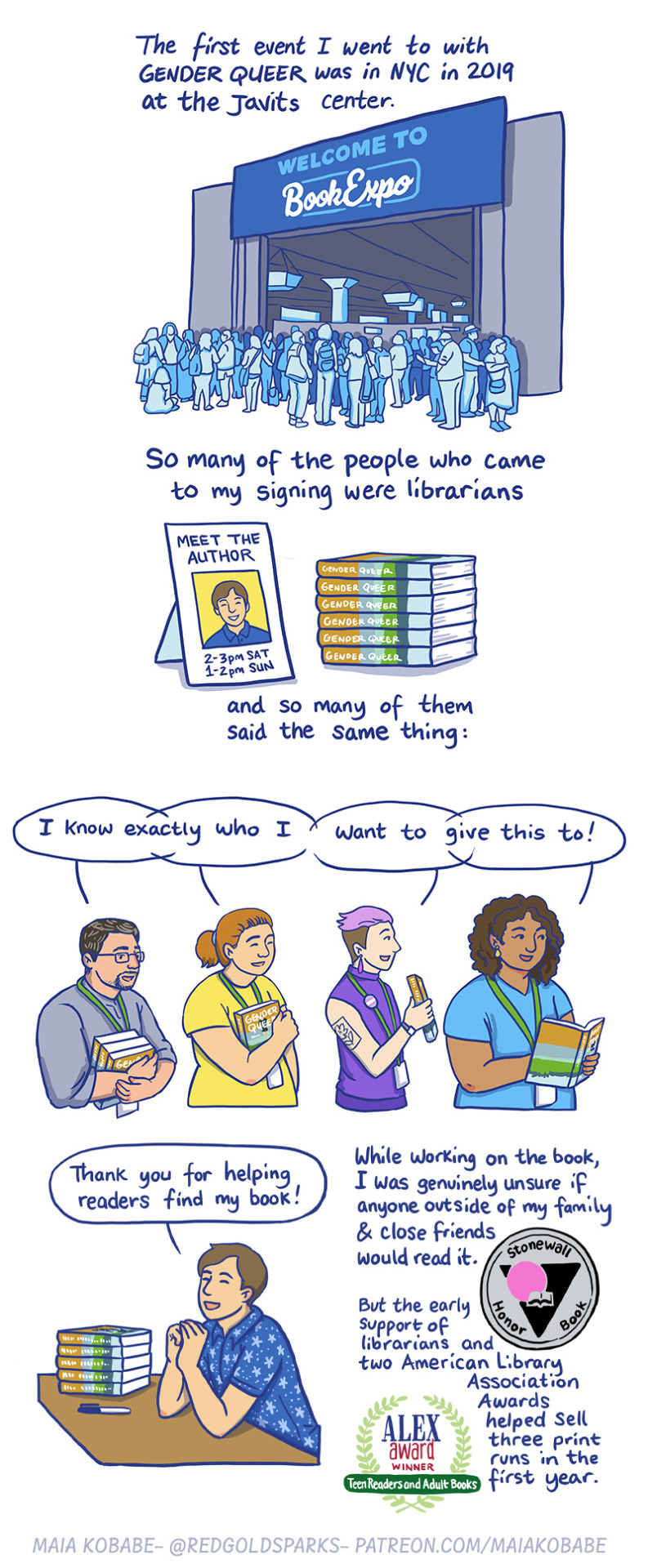
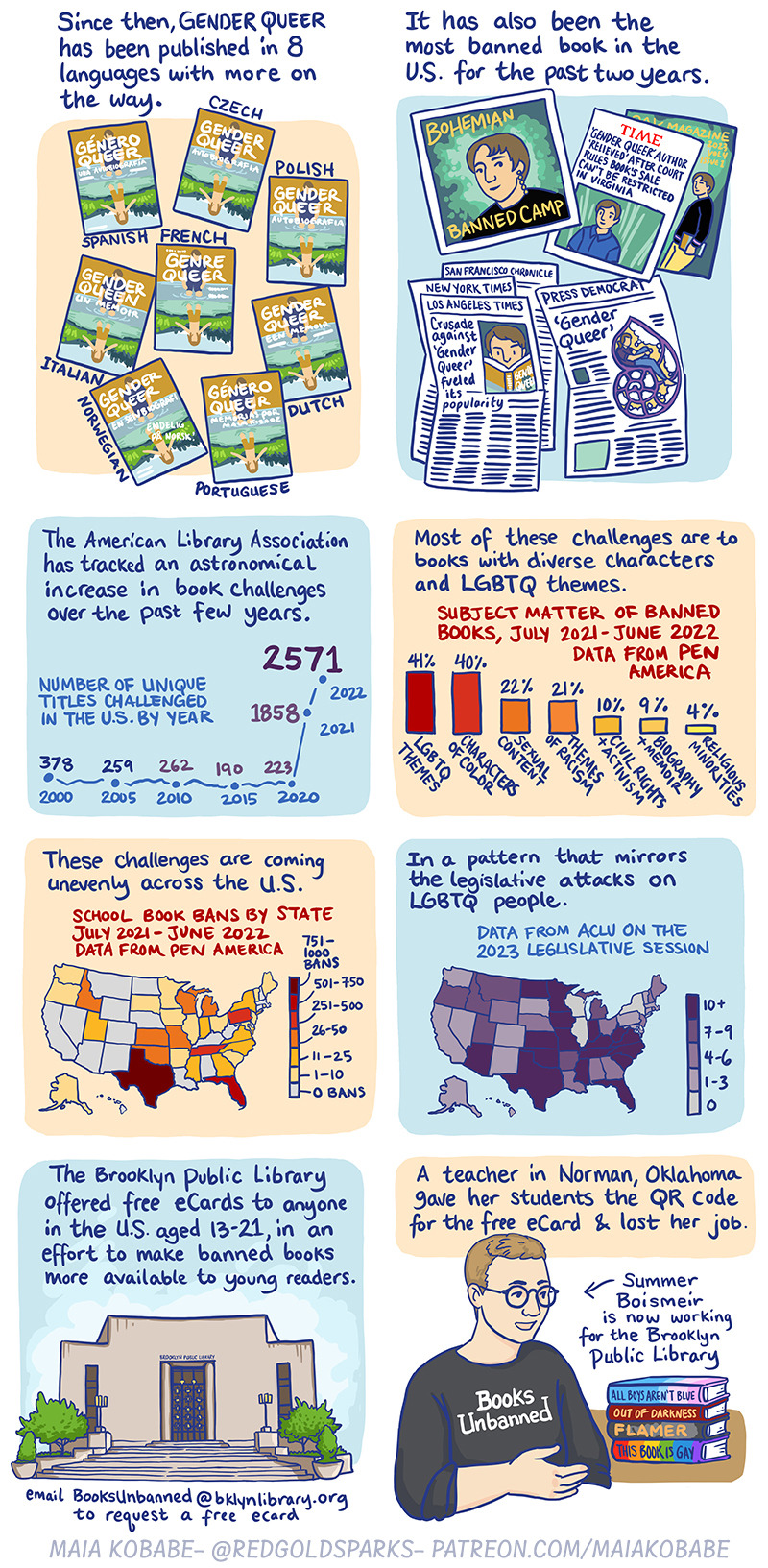
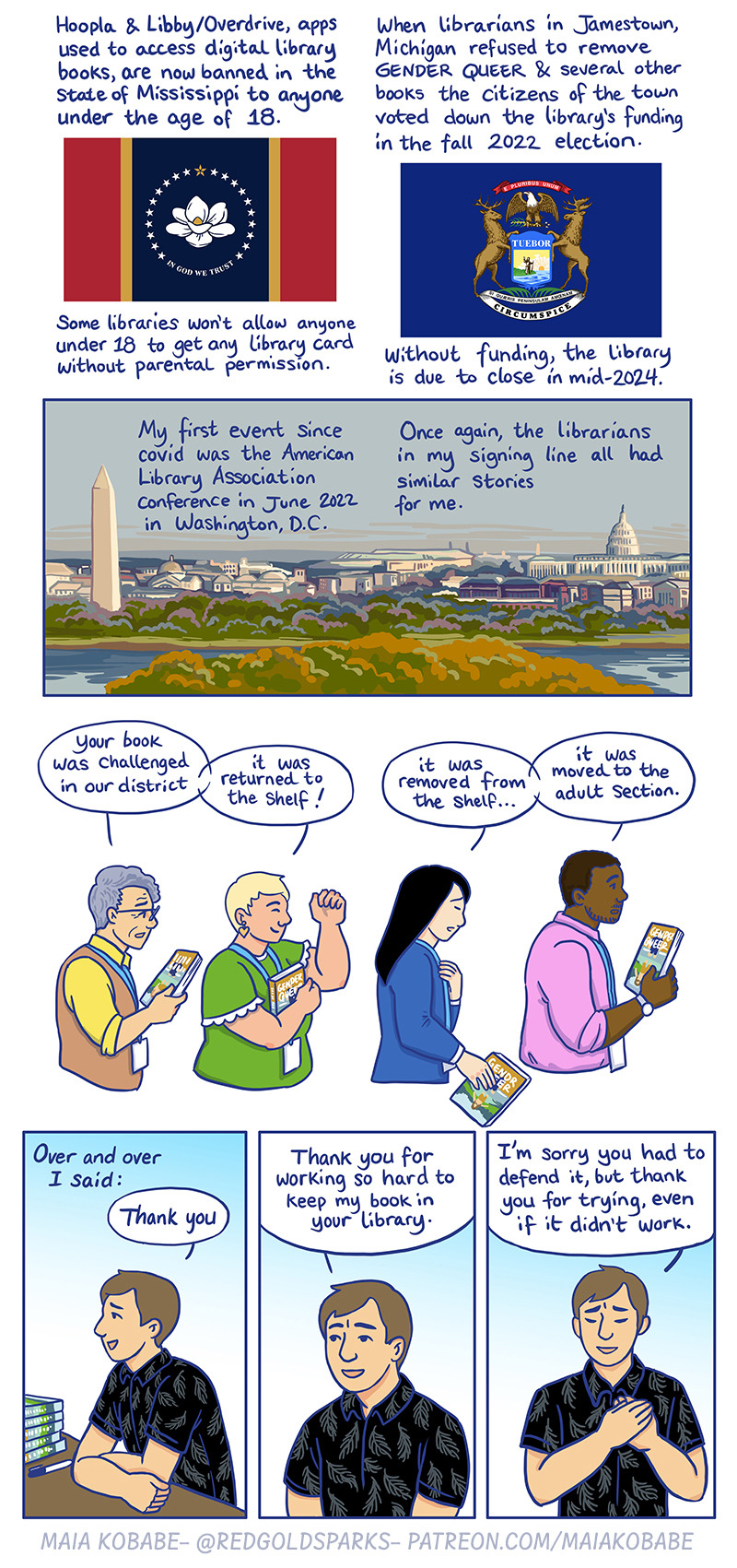
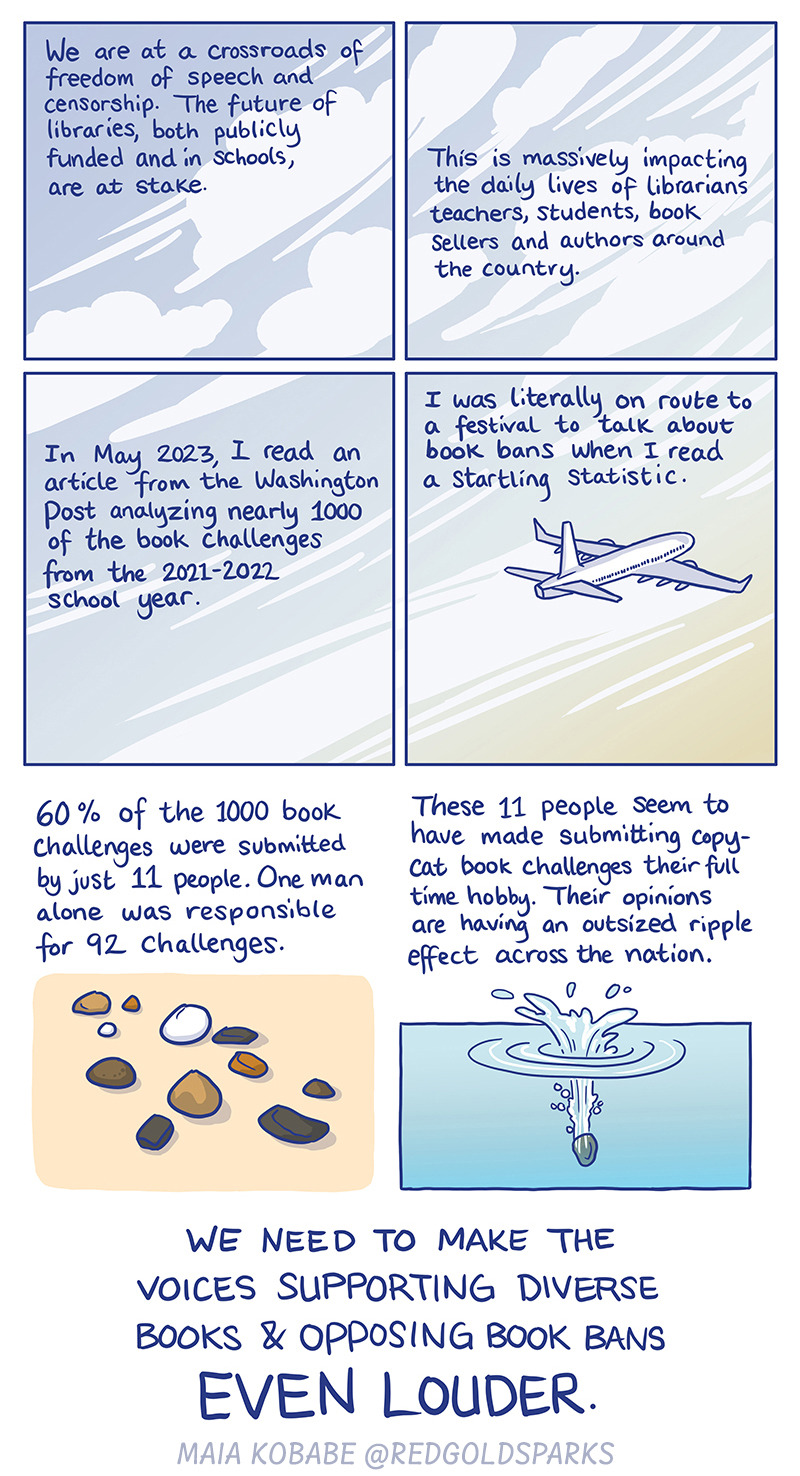
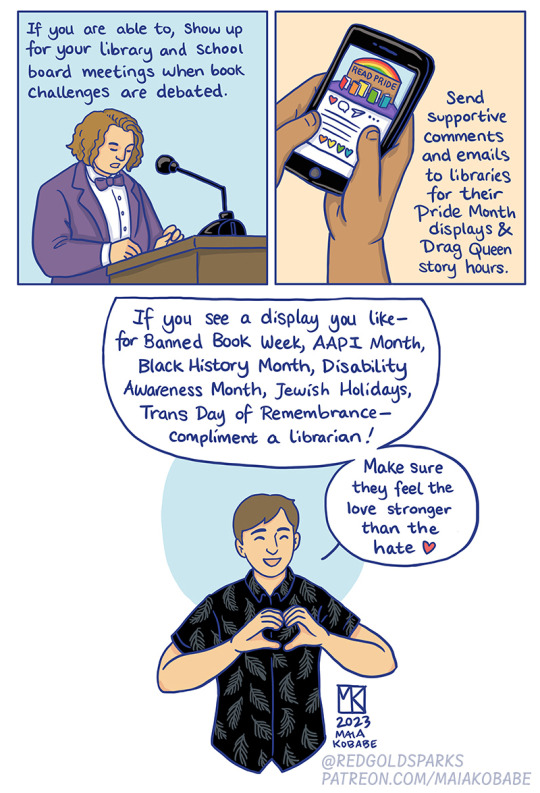
My very last comic for The Nib! End of an era! Transcription below the cut. instagram / patreon / portfolio / etsy / my book / redbubble
The first event I went to with GENDER QUEER was in NYC in 2019 at the Javits Center.
So many of the people who came to my signing were librarians, and so many of them said the same thing: "I know exactly who I want to give this to!"
Maia: "Thank you for helping readers find my book!"
While working on the book, I was genuinely unsure if anyone outside of my family and close friends would read it. But the early support of librarians and two American Library Association awards helped sell two print runs in first year.
Since then, GENDER QUEER been published in 8 languages, with more on the way: Spanish, Czech, Polish, French, Italian, Norwegian, Portugese and Dutch.
It has also been the most banned book in the United States for the past two years.
The American Library Association has tracked an astronomical increase in book challenges over the past few years. Most of these challenges are to books with diverse characters and LGBTQ themes. These challenges are coming unevenly across the US, in a pattern that mirrors the legislative attacks on LGBTQ people.
The Brooklyn Public Library offered free eCards to anyone in the US aged 13-21, in an effort to make banned books more available to young readers. A teacher in Norman, Oklahoma gave her students the QR code for the free eCard and lost her job. Summer Boismeir is now working for the Brooklyn Public Library.
Hoopla and Libby/Overdrive, apps used to access digital library books, are now banned in Mississippi to anyone under 18. Some libraries won’t allow anyone under 18 to get any kind of library card without parental permission.
When librarians in Jamestown, Michigan refused to remove GENDER QUEER and several other books, the citizens of the town voted down the library’s funding in the fall 2022 election. Without funding, the library is due to close in mid-2024.
My first event since covid hit was the American Library Association conference in June 2022 in Washington, DC. Once again, the librarians in my signing line all had similar stories for me: “Your book was challenged in our district"
"It was returned to the shelf!"
"It was removed from the shelf..."
"It was moved to the adult section."
Over and over I said: "Thank you. Thank you for working so hard to keep my book in your library. I’m sorry you had to defend it, but thank you for trying, even if it didn't work."
We are at a crossroads of freedom of speech and censorship. The future of libraries, both publicly funded and in schools, are at stake. This is massively impacting the daily lives of librarians, teachers, students, booksellers, and authors around the country. In May 2023, I read an article from the Washington Post analyzing nearly 1000 of the book challenges from the 2021-2022 school year. I was literally on route to a festival to talk about book bans when I read a startling statistic.
60% of the 1000 book challenges were submitted by just 11 people. One man alone was responsible for 92 challenges. These 11 people seem to have made submitting copy-cat book challenges their full-time hobby and their opinions are having an outsized ripple effect across the nation.
WE NEED TO MAKE THE VOICES SUPPORTING DIVERSE BOOKS AND OPPOSING BOOK BANS EVEN LOUDER.
If you are able too, show up for your library and school board meetings when book challenges are debated. Send supportive comments and emails about the Pride book display and Drag Queen story hours. If you see a display you like– for Banned Book Week, AAPI Month, Black History Month, Disability Awareness Month, Jewish holidays, Trans Day of Remembrance– compliment a librarian! Make sure they feel the love stronger than the hate <3
Maia Kobabe, 2023
The Nib
19K notes
·
View notes
Text
most trans people who people like to call "non transitioning" actually do transition, but people don't want to acknowledge that not all transition is medical
changing your hair is transition
deciding to shave or grow your body hair is transition
doing something different with make up is transition
changing your new wardrobe is transition
changing your name is transition
changing your pronouns is transition
coming out to people is transition
even just accepting your own transness without telling anyone else is transition, as it changes how you see yourself
it's almost impossible to be trans and truly non transitioning, even if that transition might be non medical, non visible or entirely self contained
all kinds of transition are valid.
there are also things that aren't necessarily associated with transition that an individual may consider to be part of their transition, like working out to make their body look different, getting piercings and tattoos and so much more
there are so many ways of transitioning besides surgery and hormones
"non transitioning nonbinary/trans person" is just code for "i don't consider your transition to be real because it doesn't fully fit into what cis people expect"
"some parents would rather have a non transitioning trans child than one who does" like yeah no shit. a non transitioning trans child is a trans child who doesn't come out, doesn't change anything about themself. not their name, not their pronouns, not their hair or wardrobe. a non transitioning trans child is a trans child who never talks about being trans so their parents can pass them off as cis. a non transitioning trans child is a trans child that is in the closet. of course a lot of parents would rather have a trans child who stays in the closet so they don't have to deal with their transness. but you all mean "non transitioning" as in "not medically transitioning" and that's not true either. trans people get kicked out of their house for doing as little as changing their pronouns. and if you say you're doing literally anything as part of your transition/because you're trans, people will absolutely give you shit for it, while a cis person can do the same thing and it's no biggie. social transition is not accepted at all.
there are some weird trans people out there who will completely dismiss people's life saving transition steps as "non transitioning" because they don't fit cis ideas of transness, it's disgusting
when i say "transition" i'm always including medical transition and social transition, as well as anything else an individual may consider part of their transition that doesn't necessarily fit into the two boxes
also can we stop acting like social transition isn't also constantly under attack
5K notes
·
View notes
Text
Reblogged a bunch of Salem's work of fat people because I saw someone say that he only draws one body type and cherry picked similar OCS based on his own body type, these people are grasping for straws to find any fucking dirt on this dude, ANYTHING short of perfect, there are people who draw nothing but skinny white women but when someone puts effort into drawing fat people and poc that's when people start complaining that it's wrong and not inclusive enough, suddenly these people become experts in anatomy and say shit like that art is so incorrect and how disrespectful it is to those people, be for fucking real now you people never cared about fat people, you're just trying to stop artists from actually making art of marginalized people and pretend you're doing this to "protect the community from bad depictions" while actively cherry picking things and harassing the artists who do care for those people. This shit happened before with "oh he's just fetishizing trans women" it's such a scummy tactic to attack minorities by using their own communities to harass an artist under a guise of fighting a phony imposter, making the artists and their peers scared to depict bodies at all at the threat of public harassment. Fuck off!!!
3K notes
·
View notes
Text
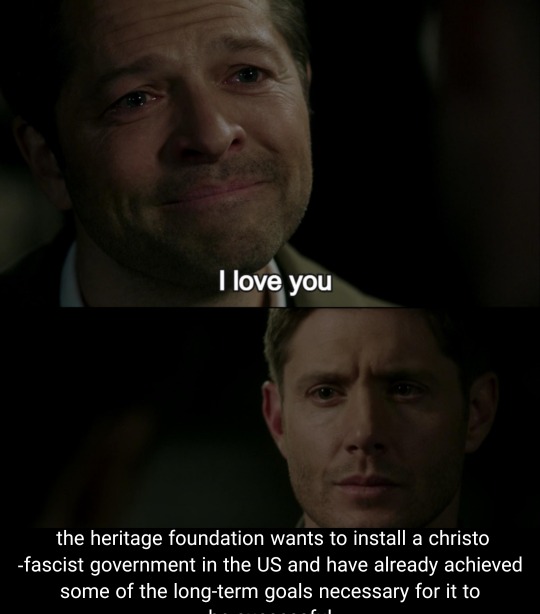
Project 25. The Heritage Foundation.
It's behind every single anti-lgbt law pushed the last year. They are why Roe v Wade was overturned. They are successful, well funded, and a massive threat.
What you can do is educate yourself and others about it. Get to know your enemy. Protest. Wear pride pins. Put out your flags. Show solidarity. We are ALL under attack by this white supremacist christo-fascist group.
Remember when 2020 had kpop stans organizing on twitter and gen z using tik tok to make Trump meets flop while white vets made themselves frontline walls at BLM protests that were organized to handle shit like kettling thanks to their amazing black organizers? Remember how people actually Showed up to those protests for awhile?
We need that cross-generational Fuck The System energy again. Not just for a summer this time. This needs to go passed the election.
They're playing a long game and so do we.
Get inspired.
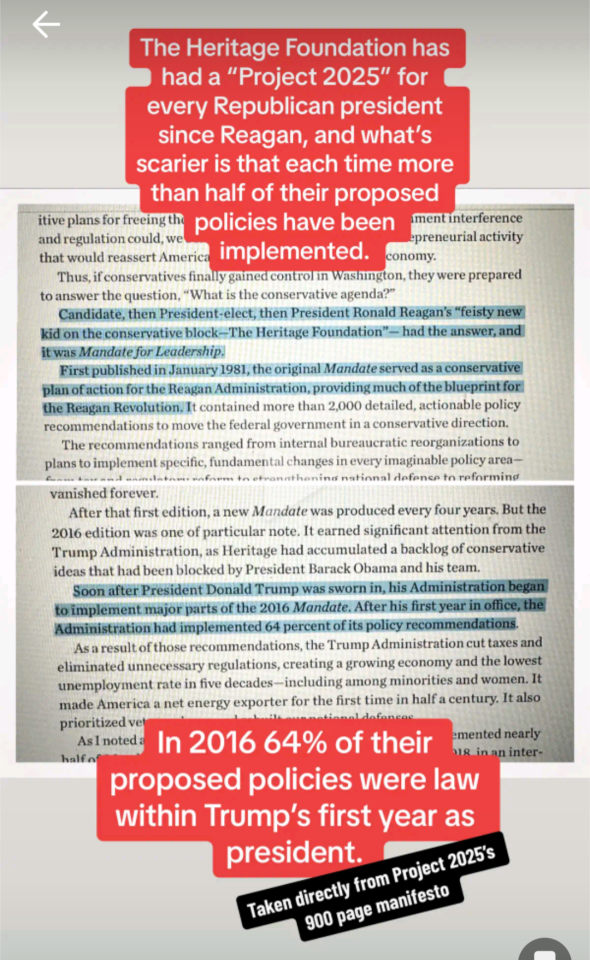
Their goals include saving the children and traditional family, and "to lay the groundwork for a White House more friendly to the right."
This translates to destroying the EPA, disability rights, and criminalizing being LGBT. Also to overthrow the US government, as stated in their manifesto.
They want to replace our democracy with a theocracy. No Republican in office was elected without their approval.
They're the kind of right that makes being LGBT punishable by death. That makes it a crime just to exist where others can see you. They want librarians who work in libraries that make LGBT books accessible to be registered sex offenders. They want you prosecuted and even specify that no mercy should be shown to people the "left" likes (ex: immigrants, black people, etc)
That's the extreme right who's been manipulating our laws.
And they plan to make things a lot worse within the first 180 days a Republican is elected president.
Source
If you don't have plans coming up.... Start organizing them. We will be okay if we work together.
We will be okay if we work together.
If we have each other, we'll be okay. We have to rely on each other. You have to be reliable. You, person reading this, have to show up. That's how this works.
I have your back if you have mine. Do not leave me to the wolves and I won't leave you.

7K notes
·
View notes
Text
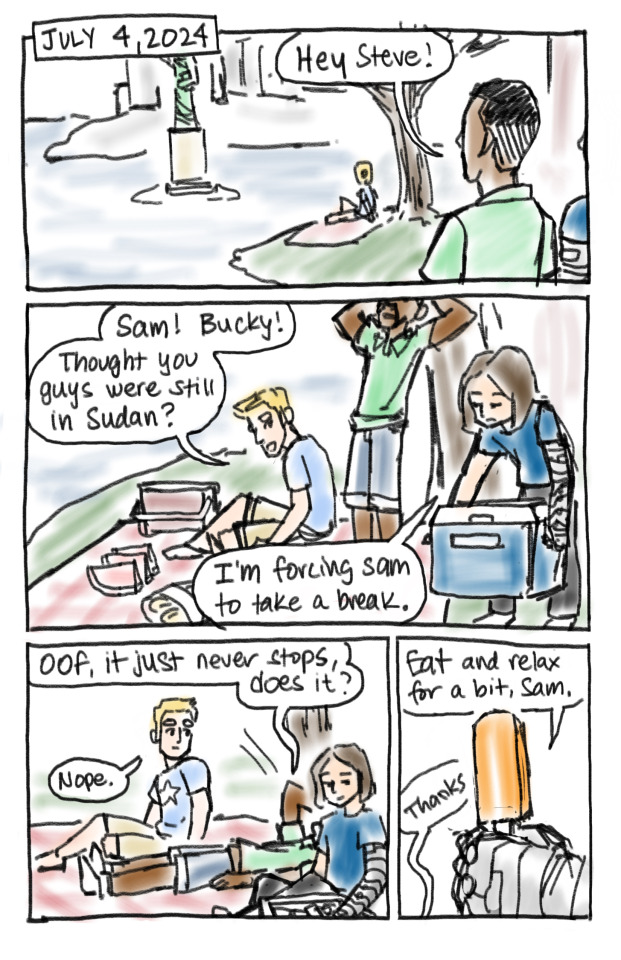

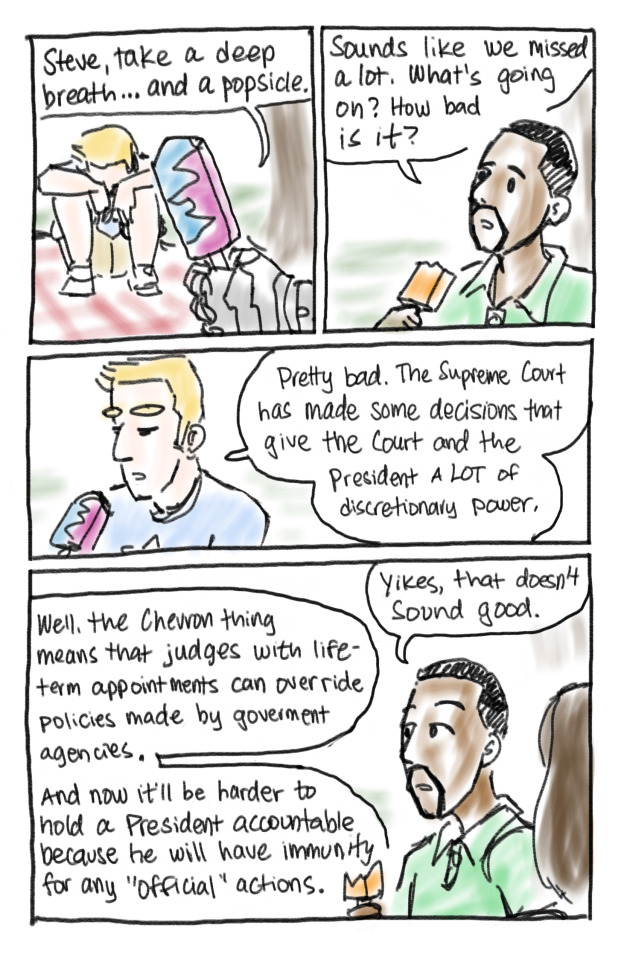
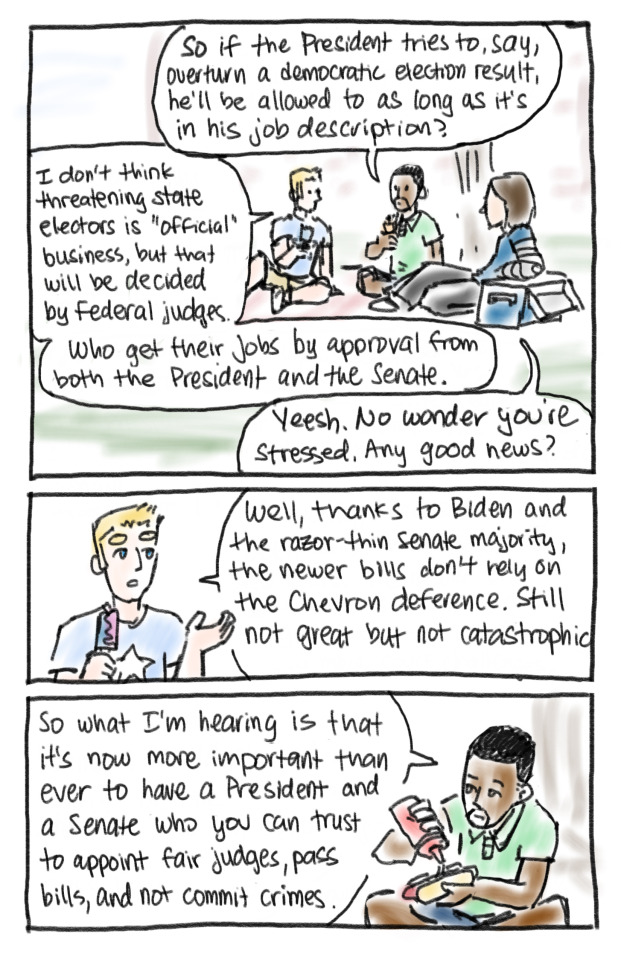
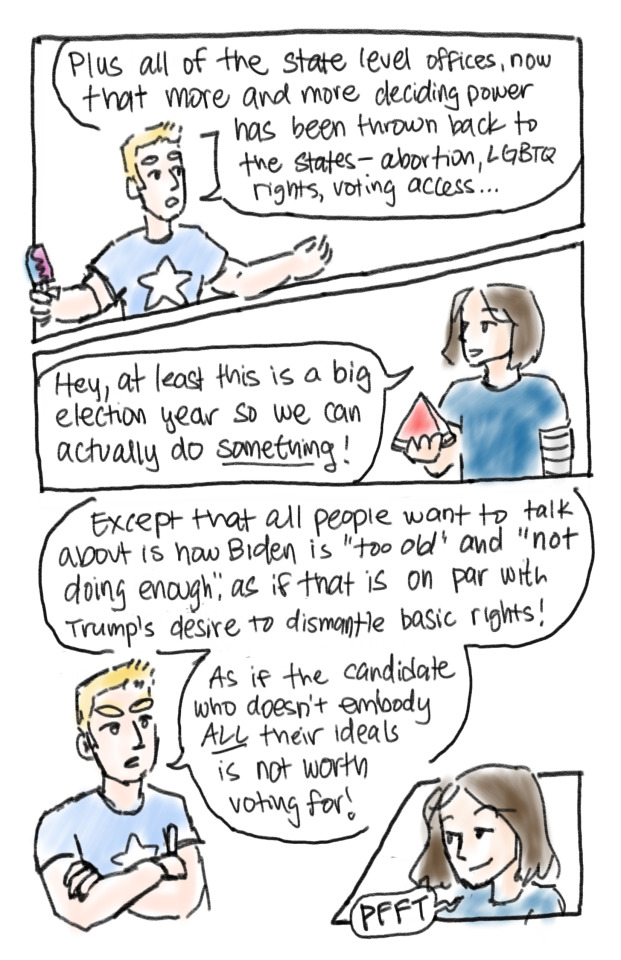
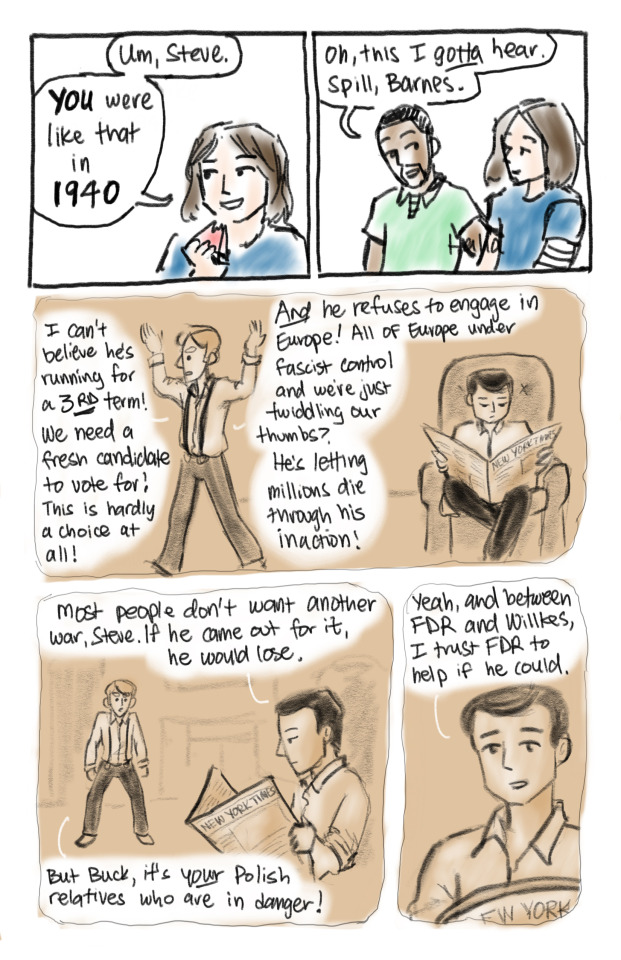
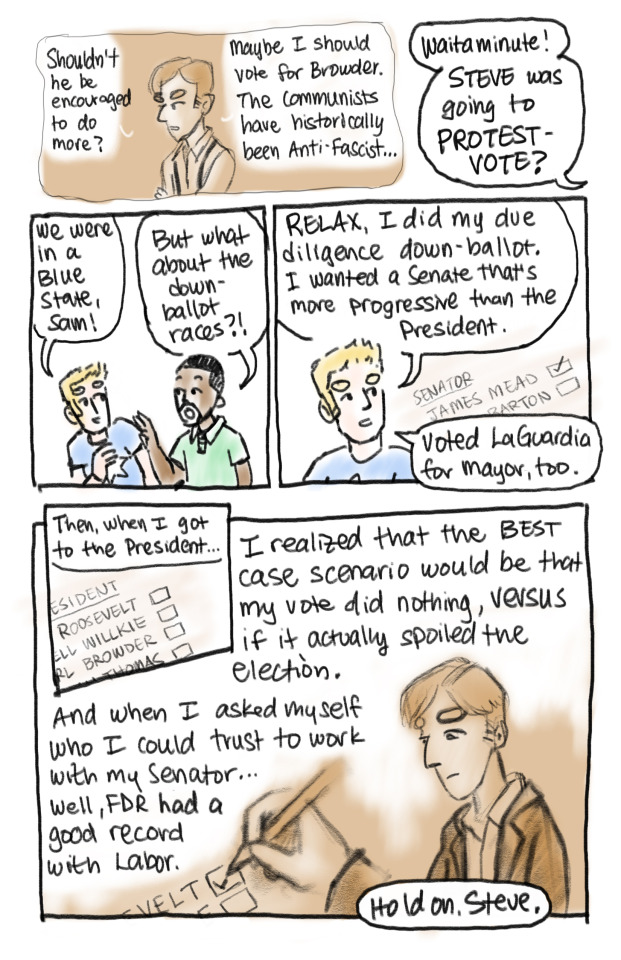
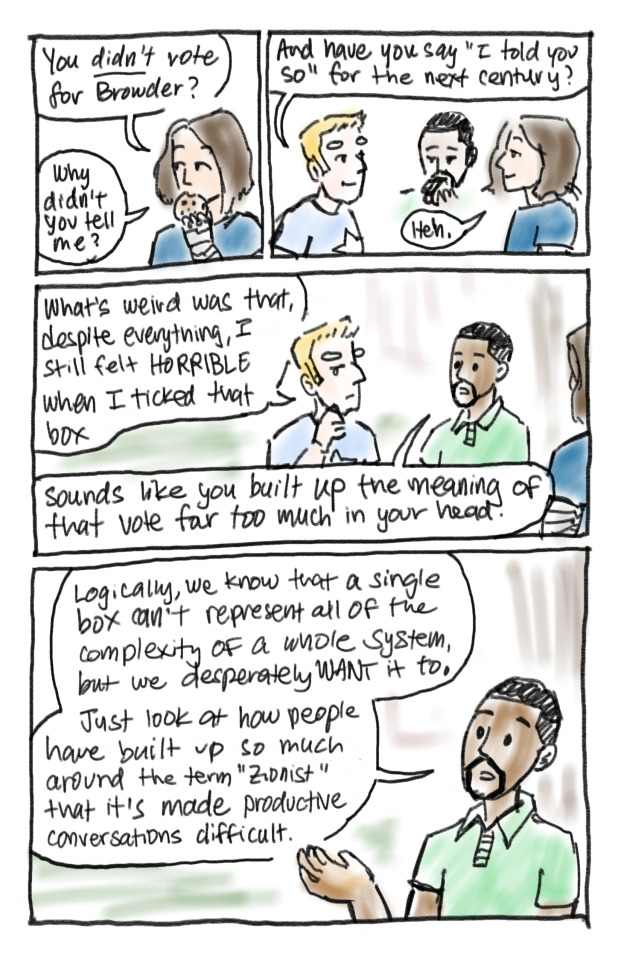
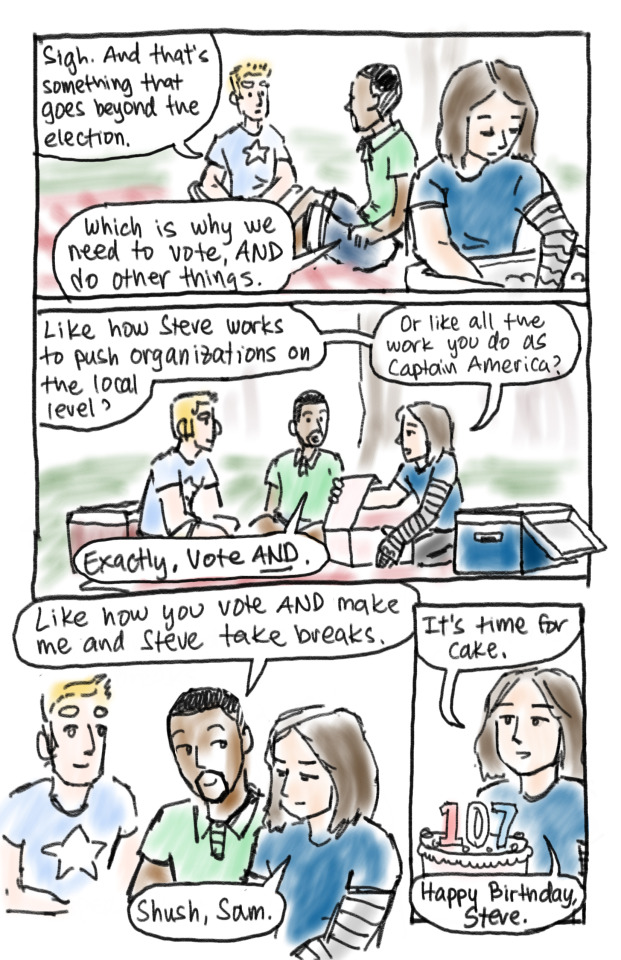
Happy July 4th, everyone, and good luck to the UK voters out there!
Wow it's Year 11 of doing these!! Here's the AO3 link to the past 10 years, and here's the tumblr link.
Reminder that this is a long game -- some of the judges making decisions were appointed back in the 80s. Many of the cases that were decided this round were from Trump's term. So it's going to take long-term, consistent voting over a decade to start tipping things in the other direction. (Which I talked about in 2018 re: Trump shenanigans and 2022 re: Dobbs).
A lot has been done by the Biden administration (I'm assuming most folks have seen this post by boreal-sea with their very helpful sources), and much of that will be overturned by Trump, especially if he gets the Senate, and especially now that he would have a blank check for anything "official". So let's make sure that doesn't happen.
And even if Trump does get elected, your decisions down-ballot might effect control of the House or Senate, or might make it easier to vote next time, plus the whole plethora of state and local issues. It's Republican state attorney generals who are challenging climate regulations, for example.
Plus, when you really get down to it, only one of the candidates plans on pardoning himself and all his friends if he wins, and attacking the government if he loses. Maybe that guy shouldn't be the President.
If you're new to voting, remember to check voter registration deadlines! I'm a permanent vote-by-mail voter and it's so nice. :)
Transcript under the readmore
Page 1:
Sam and Bucky meet up with Steve for a picnic.
Steve: Thought you guys were still in Sudan?
Bucky: I’m forcing Sam to take a break.
Sam collapses onto the picnic blanket.
Sam: Oof, it just never stops, does it?
Steve: Nope.
Bucky hands Sam an orange popsicle.
Bucky: Eat and relax for a bit, Sam.
Sam: Thanks.
Page 2:
Bucky asks Steve: How are things state-side?
Steve responds: HORRIBLE.
Bucky: I thought you’ve been tentatively hopeful about what Biden has been able to achieve?
Steve: I was! Student loans, child care, climate regulations, infrastructure, labor, trans rights … he’s quietly done a lot through regulatory improvements and congress bills. But now all people will talk about is how he’s OLD.
And then there’s the Supreme Court’s decisions … Chevron and immunity…
Steve puts his head in his hands, while Sam and Bucky look on with some concern.
Page 3:
Bucky hands Steve a blue/raspberry popsicle: Steve, take a deep breath, and a popsicle.
Sam: Sounds like we missed a lot. What’s going on? How bad is it?
Steve: Pretty bad. The Supreme Court has made some decisions that give the Court and the President A LOT of discretionary power.
Sam: Yikes, that doesn’t sound good.
Steve: Well, the Chevron thing means that judges with life-term appointments can override policies made by government agencies. And now it’ll be harder to hold a President accountable because he will have immunity for any “official” actions.
Page 4:
Sam: So if the President tries to, say, overturn a democratic election result, he’ll be allowed to as long as it’s in his job description?
Steve: I don’t think threatening state electors is “official” business, but that will be decided by federal judges. Who get their jobs by approval from both the President and the Senate.
Bucky: Yeesh. No wonder you’re stressed. Any good news?
Steve: Well, thanks the Biden and the razor-thin Senate majority, the newer bills don’t rely on the Chevron deference. Still not great but not catastrophic.
Sam, squirting ketchup on his hot dog: So what I’m hearing is that it’s now more important than ever to have a President and a Senate who you can trust to appoint fair judges, pass bills, and not commit crimes.
Page 5:
Steve: Plus all of the state level offices, now that more and more deciding power has been thrown back to the states — abortion, LGBTQ rights, voting access…
Bucky: Hey, at least this is a big election year so we can actually do something!
Steve, with his arms crossed, looking surly: Except that all people want to talk about is how Biden is “too old” and “not doing enough,” as if that is on par with Trump’s desire to dismantle basic rights! As if the candidate who doesn’t embody ALL their ideals is not worth voting for!
Bucky interrupts with a smart and a loud “PFFT.”
Page 6:
Bucky: Um, Steve. YOU were like that in 1940.
Sam, nudging Bucky: “Oh, this I gotta hear. Spill, Barnes.”
In sepia, Steve is pacing around their apartment while Bucky is sitting and reading a newspaper.
Steve: I can’t believe he’s running for a 3rd term! we need a fresh candidate to vote for! This is hardly a choice at all! AND he refuses to engage in Europe! All of Europe under fascist control and we’re just twiddling our thumbs? He’s letting millions die through his inaction!
Bucky: Most people don’t want another war, Steve. If he came out for it, he would lose.
Steve, indignant: But Buck, it’s your Polish relative who are in danger!
Bucky, closing his newspaper and looking at Steve: Yeah, and between FDR and Willkes, I trust FDR to help if he could.
Page 7:
Steve, in sepia, looking away: Should he be encouraged to do more? Maybe I should vote for Browder. The Communists have historically be Anti-Fascist.
Sam interrupts off-screen: Waitaminute! STEVE was going to PROTEST-VOTE?
Steve: We were in a Blue State, Sam!
Sam: But what about the down ballot races?!
Steve: RELAX, I did my due diligence down-ballot. I wanted a senate that’s more progressive than the President.Voted LaGuardia for Mayor, too.
Steve hesitates: Then, when I got to the President… I realized that the Best case scenario would be that my vote did nothing, versus if it actually spoiled the election. And when I asked myself who I could trust to work with my Senator… well, FDR had a good record with Labor. (sepia shot of young Steve voting)
Bucky interrupts: Hold on, Steve.
Page 8:
Bucky, eating a cookie, arching an eyebrow: You didn’t vote for Browder? Why didn’t you tell me?
Steve: And have you say “I told you so” for the next century?
Bucky: Heh.
Steve, with hand on his chin: What’s weird was that, despite everything, I still felt HORRIBLE when I ticked that box.
Sam: Sounds like you built up the meaning of that vote far too much in your head. Logically, we know that a single box can’t represent all of the complexity of a whole system, but the desperately WANT it to. Just look at how people have built up so much around the term “Zionis” that it’s made productive conversations difficult.
Page 9:
Sam and Steve speak in the background while Bucky reaches into the cooler and pulls out a box.
Steve: Sigh. And that’s something that goes beyond the election.
Sam: Which is why we need to vote, AND do other things.
Bucky, looking at Steve and Sam: Like how Steve works to push organizations on the local level? Or like all the work you do as Captain America?
Sam: Exactly. Vote AND.
Sam looks at Bucky fondly: Like how you vote AND make me and Steve take breaks.
Bucky, looking stern because he can’t handle compliments: Shush, Sam.
Bucky holds up a cake that has the number “107” on it: It’s time for cake. Happy Birthday, Steve.
#happy birthday steve#supreme court#election#steve rogers#bucky barnes#sam wilson#11th year holy fuck#mine#my comic#oh hey i'm traveling for the next month so i might be not very responsive#longpost is long but I think everyone has the longpost shrinker by default now?
1K notes
·
View notes
Text
a summar(ule)y of 196 culture
since the tumblr veterans have been kind enough to introduce us newbies to their site and culture, i think it is only fair that we explain the culture of our glorious former home to any tumblr users who might be interested in the #196 tag. keep in mind, all these things are based on my perspective of the situation.
first of all, some general information (that you might’ve already heard):
196 (r/196 on reddit) was a subreddit with only one (official) rule; "post before you leave." it was mainly a meme/shitposting sub, but it cultivated a large queer and left-leaning community. in protest of the recent api chances in reddit, 196 has shut down indefinitely until reddit reverts these changes.
now for some culture/references that you might come across
spronkus kronkus:
spronkus is this yellow, rabbit-like creature.

they were the mascot of our subreddit. their appearance can vary from images to image, but as far as i’m aware, their full outfit consists of a bandanna in the colours of the trans flag around their neck, a gun labelled as such (other wise you obviously wouldn’t know what you’re looking at), and an axe also coloured like the trans flag.
r/place:
this is a rare event on reddit where the entire website gets a huge white canvas and can start creating pixel art on it. 196 participated by collaboratively creating our mascot, spronkus with "196!" written next to them.

this version of the pixel art was recreated by me as i couldn't find a nice image of it. there were some changes between the first version and the end result, so this might not be exactly how it looked in the end
post titles/"rule":
reddit forces it's users to title every post they make. as most of the posts on 196 spoke for themselves, many user instead titled their posts "rule", to indicate that they followed the subreddit's only rule. some people also tried to make puns with the word or tried to include it in words that shared some letters (example: wor(ule)d).
anarcho-stripperism:
as the amount of cropped porn jokingly posted to the subreddit increased, the moderators decided that porn would be banned from the sub, with one exception: anarcho-stripperism. she made food fucking videos, in which she jokingly tested the fuckability of different food items (fruits, pasta, etc.)
bigotry showcase:
bigotry showcase was a post flair (basically the reddit equivalent of tags) on the subreddit and was later restricted to only be used on saturdays. under this flair people posted instances of different forms of bigotry to make fun it.
eating babies/hungryposting:
at some point, the subreddit started to pretend to like eating babies, which started a variety of memes regarding the subject. even a post flair called "hungrypost" was added because of this
goblinhog:
goblinhog is the most prominent and well-known member of the 196 moderation team. besides this, on 196 he was mostly known for changing people’s flair if you enjoyed him enough about it.
flairs:
flairs are little tags that are displayed under your name in posts or comments, they are also subreddit specific. most subreddits give their users a palette of preset flairs and the option to make your own custom flair. however, in 196 you only had the option to customize your flair during special events. if you wanted to customize your flair outside of those events (which was basically the entire time), you had to ask a mod to do it for you.
punching nazis:
from time to time, the same gif of a person with a nazi armband getting punched in the face, and promptly falling to the ground, was reposted to the subreddit. this became a sort of tradition.
discourse/drama
wasp discourse:
the wasp discourse was a one to two weeks long heated discussion that generally divided the subreddit into two factions. one side said that they were justified in killing wasps if they were attacked by them, while the other claimed that since wasps are just animals, they aren't aware of what they're doing in the same way humans are, and therefore should be spared.
drama about the british:
there was a time when jokes along the lines of "ew, british" became pretty frequent on the subreddit. as a response, some user claimed that this was akin to racism and tried to get others to stop with the jokes. a debate over whether or not it was important or necessary to stop followed afterwards.
pillar discourse:
this was a debate over which type of pillar should be considered the best (ionic; doric; corinthian). i have seen the question "which pillar is the best?" being used as a sort of greeting between 196 refugees on here.
related subreddits
195:
195 was the predecessor to 196, and also was a social experiment with the same premise as 196 (one rule, post before you leave). as the creators of 195 ended the experiment, the community wanted something with the same vibe to continue posting, and thus 196 was born.
197:
197 is another part of the 196 ecosystem and is commonly understood to be the more politically right-leaning and bigoted as 196, as some people who were banned from 196 continued posting there. besides that, the subreddits were essentially the same in terms of how they functioned.
19684:
this subreddit adds a second rule which banned all mentions of sex (that’s why it’s name is a pun on 1984). some people took this as banning all discussion of sexuality, which resulted in a community that was slightly less accepting of queer people. it is currently still up and running as the 196 moderation team wants a way to stay in contact with the community.
amendments to the posts:
u/femboy_expert:
another well-known 196 user. as the name suggests they're an expert on the subject of femboys, with their flair on 196 reading "phd in feminine boys". as the subreddit was somewhat obsessed with femboys, it's no wonder that they became popular.
u/shitcum_backup:
this was the main account of a pretty popular shitposter on the subreddit. although i didn't see them as much in the last few months, i remember them sometimes having a unique speaking pattern, in which they referred to themself in the third person.
u/monko74:
this user commented "Every day I thank god for not making me a r/196 celebrity," which led to many users of the subreddit treating them like a micro celebrity. there are even a few subreddits solely dedicated to u/monko74.
691:
a sister subreddit that inverts the rule of 196, here you would be (temporarily) banned for posting. some time ago the members of this sub initiated a rebellion/revolution against the bot who performed all the bans (roomba).
u/Smart_Calendar1874:
this wasn’t necessarily part of the subreddit, but it was a pretty popular meme. and since it’s getting posted on here again, and i know enough about it, i’ll add it to the post. this user made a post to r/AskReddit titled "How would you get a small cylinder (5.1in length, ~4.5in girth) unstuck from a mini M&Ms tube filled with butter and microwaved mashed banana? [sic]" it was pretty clear that they were referring to their penis, yet they continued to claim "it’s a cylinder," in the comment section. this lead to comments like "it is imperative that the cylinder […] remains unharmed," in response to people’s advice of cutting the m&m tube.
it's going to be very interesting to see which aspects of 196 culture are going to survive the tumblr migration, and which aspects won't be applicable on this site.
i'm obviously not the ultimate scholar on 196 lore. if i’ve missed or left out anything, or said something wrong, please comment it.
7K notes
·
View notes
Text
Erin Reed at Erin In The Morning:
On Tuesday, Democratic presidential nominee Kamala Harris announced that her pick for Vice President is Tim Walz, the governor of Minnesota. In recent years, as trans and queer people have come under attack from over a thousand proposed bills, Walz is expected to serve as a source of optimism for LGBTQ+ people. The governor’s long track record on LGBTQ+ rights positions him as a strong oppositional force against what has become a national attack on LGBTQ+ people, particularly transgender individuals.
“I am proud to announce that I've asked Tim Walz to be my running mate. As a governor, a coach, a teacher, and a veteran, he's delivered for working families like his. It's great to have him on the team. Now let’s get to work. Join us,” read Harris’ statement on Twitter.
Walz has taken decisive action against attacks on transgender people in surrounding states, making Minnesota a refuge for those seeking care. In 2023, he signed an executive order protecting transgender people from out-of-state prosecution if they seek care within Minnesota’s borders. The executive order also issued a bulletin to health insurance companies, mandating coverage and initiating investigations into health insurance denials in the state.
In 2024, Walz signed a bill banning the gay and transgender panic defense. This defense is often used to help individuals avoid murder charges or receive lighter sentences by asserting that they were "deceived" by a romantic partner who was gay or transgender. According to one study, the transgender panic defense has been used at least 351 times.
Walz's pro-LGBTQ+ record goes back much further than his time as governor. In 1999, he sponsored the first gay-straight alliance at his high school while working as a teacher. In Congress, he co-sponsored the repeal of the Defense of Marriage Act and voted to repeal Don’t Ask, Don’t Tell.
Minnesota Gov. Tim Walz (D)’s track record on LGBTQ+ issues has been stellar, dating back to his pre-Congress days.
This makes me glad that he is the nominee.
#Tim Walz#Minnesota#2024 Presidential Election#Gender Affirming Healthcare#Gay Straight Alliance#Schools#Trans Panic Defense#Gay Panic Defense#Minnesota SF5216#Transgender Safe Refuge#Transgender Sanctuary State#Minnesota Gender Affirming Care EO
526 notes
·
View notes
Text
Holy shit, the New York Times is FINALLY interviewing and listening to detransistioners.
The tide is turning.
Opinion by Pamela Paul
As Kids, They Thought They Were Trans. They No Longer Do.
Feb. 2, 2024

Grace Powell was 12 or 13 when she discovered she could be a boy.
Growing up in a relatively conservative community in Grand Rapids, Mich., Powell, like many teenagers, didn’t feel comfortable in her own skin. She was unpopular and frequently bullied. Puberty made everything worse. She suffered from depression and was in and out of therapy.
“I felt so detached from my body, and the way it was developing felt hostile to me,” Powell told me. It was classic gender dysphoria, a feeling of discomfort with your sex.
Reading about transgender people online, Powell believed that the reason she didn’t feel comfortable in her body was that she was in the wrong body. Transitioning seemed like the obvious solution. The narrative she had heard and absorbed was that if you don’t transition, you’ll kill yourself.
At 17, desperate to begin hormone therapy, Powell broke the news to her parents. They sent her to a gender specialist to make sure she was serious. In the fall of her senior year of high school, she started cross-sex hormones. She had a double mastectomy the summer before college, then went off as a transgender man named Grayson to Sarah Lawrence College, where she was paired with a male roommate on a men’s floor. At 5-foot-3, she felt she came across as a very effeminate gay man.
At no point during her medical or surgical transition, Powell says, did anyone ask her about the reasons behind her gender dysphoria or her depression. At no point was she asked about her sexual orientation. And at no point was she asked about any previous trauma, and so neither the therapists nor the doctors ever learned that she’d been sexually abused as a child.
“I wish there had been more open conversations,” Powell, now 23 and detransitioned, told me. “But I was told there is one cure and one thing to do if this is your problem, and this will help you.”
Progressives often portray the heated debate over childhood transgender care as a clash between those who are trying to help growing numbers of children express what they believe their genders to be and conservative politicians who won’t let kids be themselves.
But right-wing demagogues are not the only ones who have inflamed this debate. Transgender activists have pushed their own ideological extremism, especially by pressing for a treatment orthodoxy that has faced increased scrutiny in recent years. Under that model of care, clinicians are expected to affirm a young person’s assertion of gender identity and even provide medical treatment before, or even without, exploring other possible sources of distress.
Many who think there needs to be a more cautious approach — including well-meaning liberal parents, doctors and people who have undergone gender transition and subsequently regretted their procedures — have been attacked as anti-trans and intimidated into silencing their concerns.
And while Donald Trump denounces “left-wing gender insanity” and many trans activists describe any opposition as transphobic, parents in America’s vast ideological middle can find little dispassionate discussion of the genuine risks or trade-offs involved in what proponents call gender-affirming care.
Powell’s story shows how easy it is for young people to get caught up by the pull of ideology in this atmosphere.
“What should be a medical and psychological issue has been morphed into a political one,” Powell lamented during our conversation. “It’s a mess.”
A New and Growing Group of Patients
Many transgender adults are happy with their transitions and, whether they began to transition as adults or adolescents, feel it was life changing, even lifesaving. The small but rapidly growing number of children who express gender dysphoria and who transition at an early age, according to clinicians, is a recent and more controversial phenomenon.
Laura Edwards-Leeper, the founding psychologist of the first pediatric gender clinic in the United States, said that when she started her practice in 2007, most of her patients had longstanding and deep-seated gender dysphoria. Transitioning clearly made sense for almost all of them, and any mental health issues they had were generally resolved through gender transition.
“But that is just not the case anymore,” she told me recently. While she doesn’t regret transitioning the earlier cohort of patients and opposes government bans on transgender medical care, she said, “As far as I can tell, there are no professional organizations who are stepping in to regulate what’s going on.”

Most of her patients now, she said, have no history of childhood gender dysphoria. Others refer to this phenomenon, with some controversy, as rapid onset gender dysphoria, in which adolescents, particularly tween and teenage girls, express gender dysphoria despite never having done so when they were younger. Frequently, they have mental health issues unrelated to gender. While professional associations say there is a lack of quality research on rapid onset gender dysphoria, several researchers have documented the phenomenon, and many health care providers have seen evidence of it in their practices.
“The population has changed drastically,” said Edwards-Leeper, a former head of the Child and Adolescent Committee for the World Professional Association for Transgender Health, the organization responsible for setting gender transition guidelines for medical professionals.
For these young people, she told me, “you have to take time to really assess what’s going on and hear the timeline and get the parents’ perspective in order to create an individualized treatment plan. Many providers are completely missing that step.”
Yet those health care professionals and scientists who do not think clinicians should automatically agree to a young person’s self-diagnosis are often afraid to speak out. A report commissioned by the National Health Service about Britain’s Tavistock gender clinic, which, until it was ordered to be shut down, was the country’s only health center dedicated to gender identity, noted that “primary and secondary care staff have told us that they feel under pressure to adopt an unquestioning affirmative approach and that this is at odds with the standard process of clinical assessment and diagnosis that they have been trained to undertake in all other clinical encounters.”
Of the dozens of students she’s trained as psychologists, Edwards-Leeper said, few still seem to be providing gender-related care. While her students have left the field for various reasons, “some have told me that they didn’t feel they could continue because of the pushback, the accusations of being transphobic, from being pro-assessment and wanting a more thorough process,” she said.
They have good reasons to be wary. Stephanie Winn, a licensed marriage and family therapist in Oregon, was trained in gender-affirming care and treated multiple transgender patients. But in 2020, after coming across detransition videos online, she began to doubt the gender-affirming model. In 2021 she spoke out in favor of approaching gender dysphoria in a more considered way, urging others in the field to pay attention to detransitioners, people who no longer consider themselves transgender after undergoing medical or surgical interventions. She has since been attacked by transgender activists. Some threatened to send complaints to her licensing board saying that she was trying to make trans kids change their minds through conversion therapy.
In April 2022, the Oregon Board of Licensed Professional Counselors and Therapists told Winn that she was under investigation. Her case was ultimately dismissed, but Winn no longer treats minors and practices only online, where many of her patients are worried parents of trans-identifying children.
“I don’t feel safe having a location where people can find me,” she said.
Detransitioners say that only conservative media outlets seem interested in telling their stories, which has left them open to attacks as hapless tools of the right, something that frustrated and dismayed every detransitioner I interviewed. These are people who were once the trans-identified kids that so many organizations say they’re trying to protect — but when they change their minds, they say, they feel abandoned.
Most parents and clinicians are simply trying to do what they think is best for the children involved. But parents with qualms about the current model of care are frustrated by what they see as a lack of options.
Parents told me it was a struggle to balance the desire to compassionately support a child with gender dysphoria while seeking the best psychological and medical care. Many believed their kids were gay or dealing with an array of complicated issues. But all said they felt compelled by gender clinicians, doctors, schools and social pressure to accede to their child’s declared gender identity even if they had serious doubts. They feared it would tear apart their family if they didn’t unquestioningly support social transition and medical treatment. All asked to speak anonymously, so desperate were they to maintain or repair any relationship with their children, some of whom were currently estranged.
Several of those who questioned their child’s self-diagnosis told me it had ruined their relationship. A few parents said simply, “I feel like I’ve lost my daughter.”
One mother described a meeting with 12 other parents in a support group for relatives of trans-identified youth where all of the participants described their children as autistic or otherwise neurodivergent. To all questions, the woman running the meeting replied, “Just let them transition.” The mother left in shock. How would hormones help a child with obsessive-compulsive disorder or depression? she wondered.
Some parents have found refuge in anonymous online support groups. There, people share tips on finding caregivers who will explore the causes of their children’s distress or tend to their overall emotional and developmental health and well-being without automatically acceding to their children’s self-diagnosis.
Many parents of kids who consider themselves trans say their children were introduced to transgender influencers on YouTube or TikTok, a phenomenon intensified for some by the isolation and online cocoon of Covid. Others say their kids learned these ideas in the classroom, as early as elementary school, often in child-friendly ways through curriculums supplied by trans rights organizations, with concepts like the gender unicorn or the Genderbread person.
‘Do You Want a Dead Son or a Live Daughter?’
After Kathleen’s 15-year-old son, whom she described as an obsessive child, abruptly told his parents he was trans, the doctor who was going to assess whether he had A.D.H.D. referred him instead to someone who specialized in both A.D.H.D. and gender. Kathleen, who asked to be identified only by her first name to protect her son’s privacy, assumed that the specialist would do some kind of evaluation or assessment. That was not the case.
The meeting was brief and began on a shocking note. “In front of my son, the therapist said, ‘Do you want a dead son or a live daughter?’” Kathleen recounted.
Parents are routinely warned that to pursue any path outside of agreeing with a child’s self-declared gender identity is to put a gender dysphoric youth at risk for suicide, which feels to many people like emotional blackmail. Proponents of the gender-affirming model have cited studies showing an association between that standard of care and a lower risk of suicide. But those studies were found to have methodological flaws or have been deemed not entirely conclusive. A survey of studies on the psychological effects of cross-sex hormones, published three years ago in The Journal of the Endocrine Society, the professional organization for hormone specialists, found it “could not draw any conclusions about death by suicide.” In a letter to The Wall Street Journal last year, 21 experts from nine countries said that survey was one reason they believed there was “no reliable evidence to suggest that hormonal transition is an effective suicide prevention measure.”
Moreover, the incidence of suicidal thoughts and attempts among gender dysphoric youth is complicated by the high incidence of accompanying conditions, such as autism spectrum disorder. As one systematic overview put it, “Children with gender dysphoria often experience a range of psychiatric comorbidities, with a high prevalence of mood and anxiety disorders, trauma, eating disorders and autism spectrum conditions, suicidality and self-harm.”
But rather than being treated as patients who deserve unbiased professional help, children with gender dysphoria often become political pawns.
Conservative lawmakers are working to ban access to gender care for minors and occasionally for adults as well. On the other side, however, many medical and mental health practitioners feel their hands have been tied by activist pressure and organizational capture. They say that it has become difficult to practice responsible mental health care or medicine for these young people.
Pediatricians, psychologists and other clinicians who dissent from this orthodoxy, believing that it is not based on reliable evidence, feel frustrated by their professional organizations. The American Psychological Association, American Psychiatric Association and the American Academy of Pediatrics have wholeheartedly backed the gender-affirming model.
In 2021, Aaron Kimberly, a 50-year-old trans man and registered nurse, left the clinic in British Columbia where his job focused on the intake and assessment of gender-dysphoric youth. Kimberly received a comprehensive screening when he embarked on his own successful transition at age 33, which resolved the gender dysphoria he experienced from an early age.
But when the gender-affirming model was introduced at his clinic, he was instructed to support the initiation of hormone treatment for incoming patients regardless of whether they had complex mental problems, experiences with trauma or were otherwise “severely unwell,” Kimberly said. When he referred patients for further mental health care rather than immediate hormone treatment, he said he was accused of what they called gatekeeping and had to change jobs.
“I realized something had gone totally off the rails,” Kimberly, who subsequently founded the Gender Dysphoria Alliance and the L.G.B.T. Courage Coalition to advocate better gender care, told me.
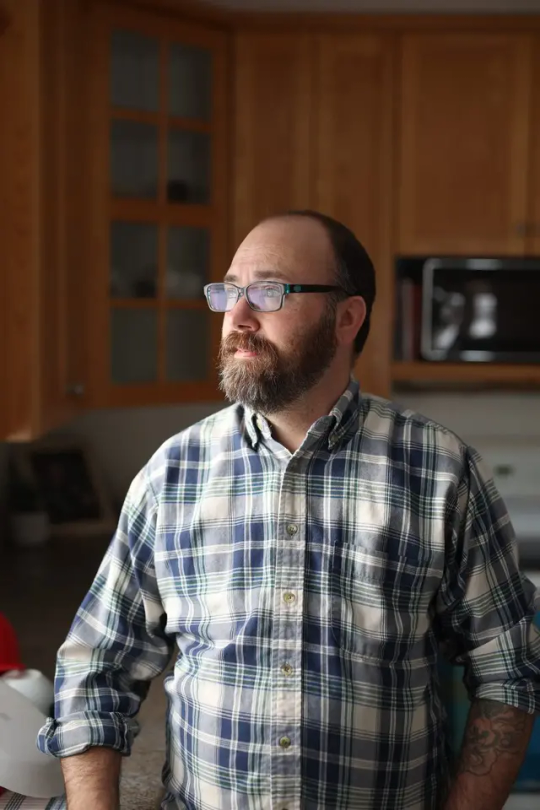
Gay men and women often told me they fear that same-sex-attracted kids, especially effeminate boys and tomboy girls who are gender nonconforming, will be transitioned during a normal phase of childhood and before sexual maturation — and that gender ideology can mask and even abet homophobia.
As one detransitioned man, now in a gay relationship, put it, “I was a gay man pumped up to look like a woman and dated a lesbian who was pumped up to look like a man. If that’s not conversion therapy, I don’t know what is.”
“I transitioned because I didn’t want to be gay,” Kasey Emerick, a 23-year-old woman and detransitioner from Pennsylvania, told me. Raised in a conservative Christian church, she said, “I believed homosexuality was a sin.”
When she was 15, Emerick confessed her homosexuality to her mother. Her mother attributed her sexual orientation to trauma — Emerick’s father was convicted of raping and assaulting her repeatedly when she was between the ages of 4 and 7 — but after catching Emerick texting with another girl at age 16, she took away her phone. When Emerick melted down, her mother admitted her to a psychiatric hospital. While there, Emerick told herself, “If I was a boy, none of this would have happened.”
In May 2017, Emerick began searching “gender” online and encountered trans advocacy websites. After realizing she could “pick the other side,” she told her mother, “I’m sick of being called a dyke and not a real girl.” If she were a man, she’d be free to pursue relationships with women.
That September, she and her mother met with a licensed professional counselor for the first of two 90-minute consultations. She told the counselor that she had wished to be a Boy Scout rather than a Girl Scout. She said she didn’t like being gay or a butch lesbian. She also told the counselor that she had suffered from anxiety, depression and suicidal ideation. The clinic recommended testosterone, which was prescribed by a nearby L.G.B.T.Q. health clinic. Shortly thereafter, she was also diagnosed with A.D.H.D. She developed panic attacks. At age 17, she was cleared for a double mastectomy.
“I’m thinking, ‘Oh my God, I’m having my breasts removed. I’m 17. I’m too young for this,’” she recalled. But she went ahead with the operation.
“Transition felt like a way to control something when I couldn’t control anything in my life,” Emerick explained. But after living as a trans man for five years, Emerick realized her mental health symptoms were only getting worse. In the fall of 2022, she came out as a detransitioner on Twitter and was immediately attacked. Transgender influencers told her she was bald and ugly. She received multiple threats.
“I thought my life was over,” she said. “I realized that I had lived a lie for over five years.”

Today Emerick’s voice, permanently altered by testosterone, is that of a man. When she tells people she’s a detransitioner, they ask when she plans to stop taking T and live as a woman. “I’ve been off it for a year,” she replies.
Once, after she recounted her story to a therapist, the therapist tried to reassure her. If it’s any consolation, the therapist remarked, “I would never have guessed that you were once a trans woman.” Emerick replied, “Wait, what sex do you think I am?”
To the trans activist dictum that children know their gender best, it is important to add something all parents know from experience: Children change their minds all the time. One mother told me that after her teenage son desisted — pulled back from a trans identity before any irreversible medical procedures — he explained, “I was just rebelling. I look at it like a subculture, like being goth.”
“The job of children and adolescents is to experiment and explore where they fit into the world, and a big part of that exploration, especially during adolescence, is around their sense of identity,” Sasha Ayad, a licensed professional counselor based in Phoenix, told me. “Children at that age often present with a great deal of certainty and urgency about who they believe they are at the time and things they would like to do in order to enact that sense of identity.”
Ayad, a co-author of “When Kids Say They’re Trans: A Guide for Thoughtful Parents,” advises parents to be wary of the gender affirmation model. “We’ve always known that adolescents are particularly malleable in relationship to their peers and their social context and that exploration is often an attempt to navigate difficulties of that stage, such as puberty, coming to terms with the responsibilities and complications of young adulthood, romance and solidifying their sexual orientation,” she told me. For providing this kind of exploratory approach in her own practice with gender dysphoric youth, Ayad has had her license challenged twice, both times by adults who were not her patients. Both times, the charges were dismissed.
Studies show that around eight in 10 cases of childhood gender dysphoria resolve themselves by puberty and 30 percent of people on hormone therapy discontinue its use within four years, though the effects, including infertility, are often irreversible.
Proponents of early social transition and medical interventions for gender dysphoric youth cite a 2022 study showing that 98 percent of children who took both puberty blockers and cross-sex hormones continued treatment for short periods, and another study that tracked 317 children who socially transitioned between the ages of 3 and 12, which found that 94 percent of them still identified as transgender five years later. But such early interventions may cement children’s self-conceptions without giving them time to think or sexually mature.
‘The Process of Transition Didn’t Make Me Feel Better’
At the end of her freshman year of college, Grace Powell, horrifically depressed, began dissociating, feeling detached from her body and from reality, which had never happened to her before. Ultimately, she said, “the process of transition didn’t make me feel better. It magnified what I found was wrong with myself.”
“I expected it to change everything, but I was just me, with a slightly deeper voice,” she added. “It took me two years to start detransitioning and living as Grace again.”
She tried in vain to find a therapist who would treat her underlying issues, but they kept asking her: How do you want to be seen? Do you want to be nonbinary? Powell wanted to talk about her trauma, not her identity or her gender presentation. She ended up getting online therapy from a former employee of the Tavistock clinic in Britain. This therapist, a woman who has broken from the gender-affirming model, talked Grace through what she sees as her failure to launch and her efforts to reset. The therapist asked questions like: Who is Grace? What do you want from your life? For the first time, Powell felt someone was seeing and helping her as a person, not simply looking to slot her into an identity category.
Many detransitioners say they face ostracism and silencing because of the toxic politics around transgender issues.
“It is extraordinarily frustrating to feel that something I am is inherently political,” Powell told me. “I’ve been accused multiple times that I’m some right-winger who’s making a fake narrative to discredit transgender people, which is just crazy.”
While she believes there are people who benefit from transitioning, “I wish more people would understand that there’s not a one-size-fits-all solution,” she said. “I wish we could have that conversation.”
In a recent study in The Archives of Sexual Behavior, about 40 young detransitioners out of 78 surveyed said they had suffered from rapid onset gender dysphoria. Trans activists have fought hard to suppress any discussion of rapid onset gender dysphoria, despite evidence that the condition is real. In its guide for journalists, the activist organization GLAAD warns the media against using the term, as it is not “a formal condition or diagnosis.” Human Rights Campaign, another activist group, calls it “a right-wing theory.” A group of professional organizations put out a statement urging clinicians to eliminate the term from use.
Nobody knows how many young people desist after social, medical or surgical transitions. Trans activists often cite low regret rates for gender transition, along with low figures for detransition. But those studies, which often rely on self-reported cases to gender clinics, likely understate the actual numbers. None of the seven detransitioners I interviewed, for instance, even considered reporting back to the gender clinics that prescribed them medication they now consider to have been a mistake. Nor did they know any other detransitioners who had done so.
As Americans furiously debate the basis of transgender care, a number of advances in understanding have taken place in Europe, where the early Dutch studies that became the underpinning of gender-affirming care have been broadly questioned and criticized. Unlike some of the current population of gender dysphoric youth, the Dutch study participants had no serious psychological conditions. Those studies were riddled with methodological flaws and weaknesses. There was no evidence that any intervention was lifesaving. There was no long-term follow-up with any of the study’s 55 participants or the 15 who dropped out. A British effort to replicate the study said that it “identified no changes in psychological function” and that more studies were needed.
In countries like Sweden, Norway, France, the Netherlands and Britain — long considered exemplars of gender progress — medical professionals have recognized that early research on medical interventions for childhood gender dysphoria was either faulty or incomplete. Last month, the World Health Organization, in explaining why it is developing “a guideline on the health of trans and gender diverse people,” said it will cover only adults because “the evidence base for children and adolescents is limited and variable regarding the longer-term outcomes of gender-affirming care for children and adolescents.”
But in America, and Canada, the results of those widely criticized Dutch studies are falsely presented to the public as settled science.
Other countries have recently halted or limited the medical and surgical treatment of gender dysphoric youth, pending further study. Britain’s Tavistock clinic was ordered to be shut down next month, after a National Health Service-commissioned investigation found deficiencies in service and “a lack of consensus and open discussion about the nature of gender dysphoria and therefore about the appropriate clinical response.”
Meanwhile, the American medical establishment has hunkered down, stuck in an outdated model of gender affirmation. The American Academy of Pediatrics only recently agreed to conduct more research in response to yearslong efforts by dissenting experts, including Dr. Julia Mason, a self-described “bleeding-heart liberal.”
The larger threat to transgender people comes from Republicans who wish to deny them rights and protections. But the doctrinal rigidity of the progressive wing of the Democratic Party is disappointing, frustrating and counterproductive.
“I was always a liberal Democrat,” one woman whose son desisted after social transition and hormone therapy told me. “Now I feel politically homeless.”
She noted that the Biden administration has “unequivocally” supported gender-affirming care for minors, in cases in which it deems it “medically appropriate and necessary.” Rachel Levine, the assistant secretary for health at the U.S. Department of Health and Human Services, told NPR in 2022 that “there is no argument among medical professionals — pediatricians, pediatric endocrinologists, adolescent medicine physicians, adolescent psychiatrists, psychologists, et cetera — about the value and the importance of gender-affirming care.”
Of course, politics should not influence medical practice, whether the issue is birth control, abortion or gender medicine. But unfortunately, politics has gotten in the way of progress. Last year The Economist published a thorough investigation into America’s approach to gender medicine. Zanny Minton Beddoes, the editor, put the issue into political context. “If you look internationally at countries in Europe, the U.K. included, their medical establishments are much more concerned,” Beddoes told Vanity Fair. “But here — in part because this has become wrapped up in the culture wars where you have, you know, crazy extremes from the Republican right — if you want to be an upstanding liberal, you feel like you can’t say anything.”
Some people are trying to open up that dialogue, or at least provide outlets for kids and families to seek a more therapeutic approach to gender dysphoria.
Paul Garcia-Ryan is a psychotherapist in New York who cares for kids and families seeking holistic, exploratory care for gender dysphoria. He is also a detransitioner who from ages 15 to 30 fully believed he was a woman.
Garcia-Ryan is gay, but as a boy, he said, “it was much less threatening to my psyche to think that I was a straight girl born into the wrong body — that I had a medical condition that could be tended to.” When he visited a clinic at 15, the clinician immediately affirmed he was female, and rather than explore the reasons for his mental distress, simply confirmed Garcia-Ryan’s belief that he was not meant to be a man.
Once in college, he began medically transitioning and eventually had surgery on his genitals. Severe medical complications from both the surgery and hormone medication led him to reconsider what he had done, and to detransition. He also reconsidered the basis of gender affirmation, which, as a licensed clinical social worker at a gender clinic, he had been trained in and provided to clients.
“You’re made to believe these slogans,” he said. “Evidence-based, lifesaving care, safe and effective, medically necessary, the science is settled — and none of that is evidence based.”

Garcia-Ryan, 32, is now the board president of Therapy First, an organization that supports therapists who do not agree with the gender affirmation model. He thinks transition can help some people manage the symptoms of gender dysphoria but no longer believes anyone under 25 should socially, medically or surgically transition without exploratory psychotherapy first.
“When a professional affirms a gender identity for a younger person, what they are doing is implementing a psychological intervention that narrows a person’s sense of self and closes off their options for considering what’s possible for them,” Garcia-Ryan told me.
Instead of promoting unproven treatments for children, which surveys show many Americans are uncomfortable with, transgender activists would be more effective if they focused on a shared agenda. Most Americans across the political spectrum can agree on the need for legal protections for transgender adults. They would also probably support additional research on the needs of young people reporting gender dysphoria so that kids could get the best treatment possible.
A shift in this direction would model tolerance and acceptance. It would prioritize compassion over demonization. It would require rising above culture-war politics and returning to reason. It would be the most humane path forward. And it would be the right thing to do.
*~*~*~*~*~*
For those who want tor ead more by those fighting the cancellation forquestioning, read:
Graham Lineham, who's been fighting since the beginning and paid the price, but is not seeing things turn around.
The Glinner Update, Grahan Linehan's Substack.
Kellie-Jay Keen @ThePosieParker, who's been physically attacked for organizing events for women demanding women-only spaces.
REDUXX, Feminst news & opinion.
Gays Against Groomers @againstgrmrs, A nonprofit of gay people and others within the community against the sexualization, indoctrination and medicalization of children under the guise of "LGBTQIA+"
#detransitioners#detransition#gender critical#New York Times#gays#lesbians#trans#trans insanity#long post#article#detrans#transgender#post trans#desisted
725 notes
·
View notes
Text
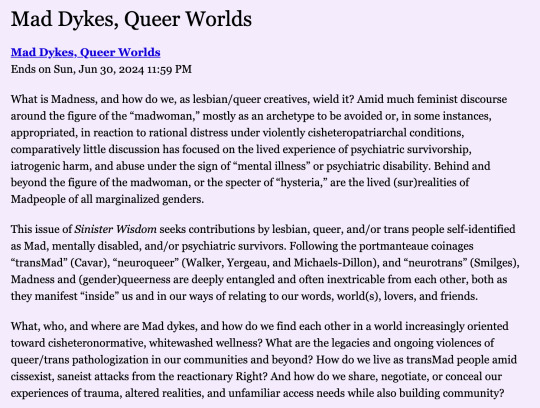
Submissions open through June 30, 2024 - Mad Dykes, Queer Worlds
Hello all! I'm editing a special issue of the literary magazine Sinister Wisdom titled Mad Dykes, Queer Worlds. If you're Mad –– regardless of personal label or diagnostic status –– and identify with some aspect of dyke experience (in all its multiplicities!), I want to consider your work for publication.
The title links to Submittable, the platform Sinister Wisdom (and most other magazines) use to process submissions. It's free to use, but can be inaccessible for visually disabled people. If that's you, email Sinister Wisdom for alternative submission options.
I am particularly interested in reading work by young/new/emerging creatives, survivors of psychiatric/medical incarceration, and/or those living outside the Global North/West. Visual art and written work are all welcome!
Note: Sinister Wisdom can't pay $; they compensate in a year-long print subscription and complementary copies of the journal. If you only submit to magazines that pay, consider checking out mine, manywor(l)ds.place; we reopen for general submissions June 1.
Feel free to email me with any further questions. Don't self-reject. ID for the image both in the alt text and below the cut.
Mad Dykes, Queer Worlds
What is Madness, and how do we, as lesbian/queer creatives, wield it? Amid much feminist discourse around the figure of the “madwoman,” mostly as an archetype to be avoided or, in some instances, appropriated, in reaction to rational distress under violently cisheteropatriarchal conditions, comparatively little discussion has focused on the lived experience of psychiatric survivorship, iatrogenic harm, and abuse under the sign of “mental illness” or psychiatric disability. Behind and beyond the figure of the madwoman, or the specter of “hysteria,” are the lived (sur)realities of Madpeople of all marginalized genders.
This issue of Sinister Wisdom seeks contributions by lesbian, queer, and/or trans people self-identified as Mad, mentally disabled, and/or psychiatric survivors. Following the portmanteaue coinages “transMad” (Cavar), “neuroqueer” (Walker, Yergeau, and Michaels-Dillon), and “neurotrans” (Smilges), Madness and (gender)queerness are deeply entangled and often inextricable from each other, both as they manifest “inside” us and in our ways of relating to our words, world(s), lovers, and friends.
What, who, and where are Mad dykes, and how do we find each other in a world increasingly oriented toward cisheteronormative, whitewashed wellness? What are the legacies and ongoing violences of queer/trans pathologization in our communities and beyond? How do we live as transMad people amid cissexist, saneist attacks from the reactionary Right? And how do we share, negotiate, or conceal our experiences of trauma, altered realities, and unfamiliar access needs while also building community?
Please submit works of any, all, or no genres, including reviews and interviews, up to 5,000 words, and a short contributor biography between 25 and 125 words. We are also seeking illustrations and photographs (.jpg or .tif files only, print resolution size at least 300 ppi). Please do not send previously published work.
Deadline for submissions: June 30, 2024
-
-
[tagging for spread hopefully! @closet-keys, @rebirthgarments, @fluoresensitive, @heavenlyyshecomes, @trans-axolotl, @fatehbaz @sawasawako @felgueirosa @bioethicists @campgender @candiedsmokedsalmon @sadhoc @osmanthusoolong @boykeats ]
#tia to everyone for sharing!!! i want to get this seen by as many ppl as possible#mine#call for submissions#madness
323 notes
·
View notes
Text
my last post was also about the discussions of transmisogyny centering cis female athletes who are women of color. there is a wider conversation being had about transmisogyny in athletics, and that is that, trans women aren't even allowed to compete. before we start discussing how transmisogyny impacts not trans fems, we need to actually center the discussion around the heavily, transmisogynstic shit that is already happening.
and when we talk about how cis woc athletes being overly masculinized and decide to call it transmisogyny instead of what it actually is, racism, it sets us back. there is this understood idea that people can be indirectly impacted by transmisogyny, but unless the subjects of those conversations are transfeminine people, then the focus shouldn't be transmisogyny.
it should be racism. it should be the fact that the white, western gender binary and idea of femininty/womanhood is so fucked up that cis girls of color from a young age are viewed as more masculine, dangerous and larger than white women. we should be focusing on the complexities of misogynoir that black girls go through from childhood to adult hood where we are both masculinized and also hypersexualized and exposed to harmful race science that gets us preyed upon by older men. we should focus on how these conversations of masculinizing women of color comes to play in how white women and white afabs (yes, i know i said i dont like using afabs but i am starting ot use it when discussing the lived experience of white afab people and how that negatively impacts people of color in queer spaces) can utilize their privilege, tears, femininity, etc., to turn society against cis girls of color and how we are automatically seen as a threat to them
we need to talk about racialized misogyny when dicussing imane khelif, and how white women like jk rowling, who has a history of transmigoyny yes, but also anti-arab/MENA racism and islamaphobia, and is prominent in alt right groups, is using her platform to attack a possible muslim, MENA woman. and that's a big thing that hardly anyone talks about - Rowling is heavily islamphobia and anti-arab. when you se guys see her attacking a MENA woman, and decide to focus solely on transmisogyny, you are quite literally erasing a huge chunk of her bigotry.
yes, indirect transmisogyny comes to play, but when you are talking about racialized misogyny, you NEED to make sure that is the main focus - racism and misogyny, because if you don't you make it hard if not impossible for us to have any type of productive conversation. you guys being too afraid to call out racism and misogyny makes it seem like you are shielding white women/afabs and white society from the pain they have put women of color through for decades.
the same goes for misogynoir??? like when we are talking about misogynoir and them completely ignore it and lump it under transmisogyny, who does that help? not only does the black community have an issue with transmisogyny in general, but it also erases a term that we've come up with to help better discuss our oppression.
also, this isn't to say that trans woc don't face racialized misogyny and misogynoir (black transfems!) because they do. but it should be understood that while THEY face these things, transmisogyny is something that should also center them. and while we, as non trans fem women do face racialized misogyny/misogynoir - yeah, sometimes we can draw comparisons between transmisogyny, but we shouldn't be the ones taking the lead or taking platforms.
and last but not least, the way you guys who are claiming what is happening to cis female athletes is transmisogynistic. Do you know how many trans people, who aren't trans fem, that i've seen saying
"see, this is why we need to talk about transmisogyny affecting non transfems! xyz athlete was actually born a woman, she's not a man, she is afab! she has a vagina!" do you realize how that language is terfy, do you realize how you guys will try to hijack convos of transmisogyny while also reinforcing transmisogynistic requirements of what makes a woman a woman?
#transgender#trans women#imane khelif#olympics#olypmics 2024#paris olympics#paris 2024#transphobia#transmisogyny#misogynoir#intersectionality#antiblackness#racism
232 notes
·
View notes
Text
Howlstar Lore Dump

I wanted to go into depth for Howlstar, simply because I enjoy making these lore dumps and people love to hate her.
~~
Howlstar (formerly Howlshard) is the current leader of RavenClan. She was the former deputy under the prior leader, Gossamerstar.
Born August 13th, 1698, she graduated early at 10 moons due to her speed and cunning. She was apprenticed by former deputy, Shallowroot. After mentoring her first apprentice, she moved on to take Shallowroot's role as deputy after his death during a redcough epidemic. She became leader of RavenClan in 1701 after Gossamerstar was swept away during a massive flood.
When she and Chipmunkstar ( formerly Chipmunktuft) were both young warriors, they had a brief secret relationship that ended when Howlstar became deputy and subsequently became more irritable. She is over the breakup, but is still soft on Chipmunkstar and will not raise her voice towards her.
Howlstar's current mate, Rippleshell, was one of four abandoned kits from a loner that RavenClan took in. They were apprentices together and got along well, and Howlstar was one of few that Rippleshell felt comfortable expressing her gender identity to.
She takes her job very seriously, and the responsibility that comes with her power often leaves her exhausted. The deaths in both her clan and family due to human interference, starvation, the prior redcough epidemic, etc keeps her on edge. She is only calm and vulnerable around Rippleshell or her sister, Lilacbreeze.
Howlstar received her ear scar from being mauled by a fox on a patrol.
Howlstar has had 2 litters with Rippleshell, for a total of 5 kits. 3 are still alive.
Howlstar is a varied mix of Oriental Shorthair, Siamese, and other such short-haired and skinny cats. While those breeds do not yet exist in the Americas during the JuniperClan story, I feel those best describe her.
Family Status
Immediate Family
Honeysplash (Mother)
Deceased due to old age
Locustshade (Father)
Deceased due to redcough outbreak
Siblings
Lilacbreeze (Sister, littermate)
Alive
Scorchpaw (Brother)
Deceased due to dog attack
Dustgale (Brother)
Deceased due to starvation
Whorlkit (Sister, littermate)
Deceased due to wasting disease
Cedarfang (Brother, littermate)
Deceased due to starvation
Mates
Rippleshell (Trans Female)
Current
Chipmunkstar (Female)
Former mate
Litter 1
Shallowkit (Son)
Deceased due to wasting disease
Blossompaw (Daughter)
Unknown, taken by Twolegs
Litter 2
Whistlecrest (Son)
Alive
Honeyfreckle (NB)
Alive
Warblerflight (Daughter)
Alive
TIMELINE
1698
August - Born, third kit in her mother's second litter.
1699
February - Began apprenticeship under Shallowroot (6m)
June - Graduated apprenticeship early (10m)
November - Becomes secret mates with AsterClan warrior, Chipmunktuft. (15m)
1700
April - Becomes deputy of RavenClan after death of Shallowroot, Chipmunktuft ends relationship (20m)
September - Becomes mates with Rippleshell (25m)
October - Mauled by fox, received permanent scarring on right ear. (27m)
December - Gives birth to her first litter (29m)
1701
May - Gives birth to her second litter (34m)
July - Becomes leader of RavenClan (36m)
#jclore#clangen#its a big one#everyone dies so much in ravenclan its insane#no wonder shes so mean everyone is dead
267 notes
·
View notes
Text
I deserve this
A/N; at this point its obvious that i inspire in rebzyyx songs
Pairing; "Your Boyfriend" x AFAB!Reader (cus people are scared of the word trans)
CW; reader becomes willing at the end i swear / unhealthy, obsessive and possesive love / sensitive topics such as mental health, depression, anxiety, fear of abandonment, dissociation, suicidal thoughts / a crazy concept: he talks about his emotions!! / non-con, violence, like, i cry while i masturbate
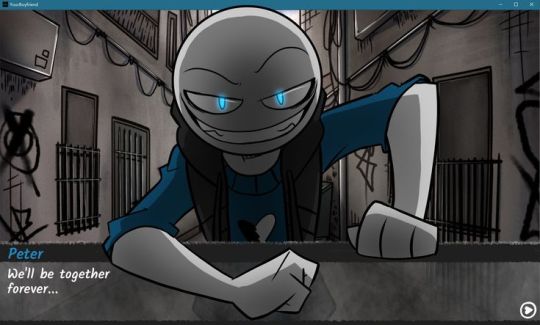
It's quite blurry trying to remember how it all started, it seemed harmless to accept a date from a stranger, he gave you a beautiful rose and was quite kind to you.
Feeling that people could like you, that someone could be romantically interested in you, because of who you are, your personality, that they knew your… desires?
Because you had dreams, of course.
…
Your dream was to live, to live a quiet life, a stable, pleasant job, with good pay, a normal and peaceful life, where the deep emptiness in your heart was non-existent, years had passed and the monotonous feeling did not disappear, you had already accepted the pain, after all, if you felt that constantly it was probably because you did something wrong at some point, right?
But that was a personal dream that would never be shared.
And it's not like that matters now, not when you're in… A room, that's funny, your last memory is of Peter slamming you against the table to tie your limbs since their last date didn't end as expected and It was time to go home.
Return to an empty home, for what? Peter was more than willing to take care of you, why was he so scary? Accepting it would have made things easier, but you ruined everything by trying to run away, you even fought tooth and nail, that was too pathetic now that you remember it, maybe you DO deserve all the shit that is happening.
You could have saved yourself so much terror and attacks.
"PETER ENOUGH! PLEASE! LET ME GO! NO! NO! FUCK, PLEASE!" You tore out your throat with terrified screams and tried to claw at his skin until your fingers were bloody, biting the hands that tried to stop your screams, hitting his face with your elbows and kicking him away, crawling like a dying animal away from him. "PETER!" You sobbed sharply before losing consciousness.
But nothing worked, resisting only made all that shit worse and now you were tied up, in Your boyfriend's old clothes.
You barely remember how you got to that place, or if time passed, anyway that doesn't matter anymore, from one day to the next you find a very small piece of clothing that turned out to be yours, time passed, your body grew but your mind didn't, they keep lying but you know that your life will depend on how well you do it.
And you're not doing it right, you tried to adopt toxic happiness but you couldn't even maintain it for a while before exploding, sadness was already an everyday thing and you just weren't feeling it anymore.
"Dear?"
Just peace please, how hard could that be? It was annoying, you even felt angry for feeling so empty, because people were so rude and the constant rejection killed you socially.
It was hard to breathe, wasn't it?
"Love? Do you hear me?"
It feels like the end, your soul is bleeding, you wish your stupid job made you feel a little more alive and motivated to continue.
And now you have done so many things to escape from that monster that pulls you back to the room to devour you under the bed.
"Darling!" Your boyfriend's voice echoed through the room, making you look at him once and for all, your eyes tired despite having been unconscious most of the time.
"…" You wanted to respond, really, but what were you supposed to say?
"You must be exhausted, you didn't even touch dinner" It was a tricky phrase, he had tried to feed you since you were tied up.
"Peter-…"
"I already told you that I prefer to be called other way, honey" He responded with a smile and a definitely not irritated tone.
"I want to sleep" He left your lips, he was being so caring, taking care of your health.
He kidnapped you.
And you couldn't even thank him for it.
He knocked you out.
You really were an ungrateful shit, weren't you?
He locked you up.
You wanted to return the signs of affection.
Soon the ropes left your body, Peter helped you stand up and you both walked to the bedroom, he was still carrying a small plate with a light dinner, he refused to let you go to bed without having eaten dinner.
Once in bed, he made sure that you had a proper dinner, and he helped you change your clothes so that you would be comfortable in bed, he also did the same with his attire and now you were both lying down. It always made your stomach churn when he looked at your half-naked body.
"Dear" He murmured next to you while you tried to sleep as soon as possible, so many things had happened those last few days that the only way out was to sleep, you had probably already been fired from your job for not showing up. "Honey, love, darling," he said sweetly as his hand went up to your cheek, he simply looked at you with a huge and probably painful smile on his face, almost tattooed, you made him so happy with your mere presence.
"Can I kiss you?" He asked, your mind still cloudy enough to refuse anything, so you just went up to kiss him, the room was very dark and there weren't even crickets echoing at night, the amount of silence was overwhelming… of course, that didn't count the lip-smacking they shared.
So it continued.
For a long time.
"Pet-…uhm, I mean, honey, I'm tired and I want to sleep" You interrupted the honey session.
"Please, you don't have to do anything, just let me love you, darling" his voice was soft, soothing to that darkness but not to the painful weight in your heart and the knot in your stomach, his touches felt strange.
You know that's wrong, you don't like it.
You didn't stop him, just like he said, you let him love you as you closed your eyes and a buzzing sound echoed in your head, like television static, your bottom clothes had disappeared, but that didn't matter.
You couldn't hear anything, you didn't see anything, your body reacted but your mind was very far from that place, you wandered through your memories, fantasies of a life you were never going to have.
It was really digging into your cunt, huh? Even when your mind wanted to flee somewhere else, it was undeniable how he held your thighs and you gasped heavily with each thrust.
His member was still dripping his seed, did he use protection? You don't know, you don't care.
It doesn't matter.
B e cau se s oon y o u w il l b e d ea d.
"Honey? Didn't you enjoy it?" Peter asked with a worried frown.
What the hell is wrong with you? Do you no longer have respect for yourself? You know it's going to hurt you.
Don't you mind dying? You lost hope and you don't even try to help yourself anymore, damned and pathetic attempt at being human, really unnecessary.
"Honey…" Peter caressed your cheeks and brought his forehead to yours, sighing softly and carrying your body to the bathroom in the room.
You didn't say anything either, you just felt how it was cleaning your body, the water was warm, the bathtub full of bubbles, and it smelled pretty good, like coconut soap. Peter hummed quietly as he treated your body with the utmost affection, you were sure he was whispering things in your ear but you were barely aware of your surroundings.
When your eyes finally focused on something you could see the ceiling of the room thanks to the moonlight, Peter was behind you, hugging your body, caressing your hair, and sniffing the soapy fragrance.
"You are so sweet, so unique, so kind, so special to me, a truly exceptional person, I will do everything to make you feel comfortable, darling, I love you so much, my adorable-…"
"Peter"
"… Yes love?" This time he didn't argue about that name, you were finally talking and that was good.
"I'm sorry I feel so alone, I know you're here but…" You wish you could give him an answer but that was something even you hadn't figured out yet.
"It's okay, honey, I'll be with you to hold you, forever."
♡
#yandere x reader#your boyfriend#yandere visual novel#yandere#your boyfriend peter#yb x y/n#yb game#yb peter#your boyfriend x reader#smut#tw noncon#afab reader
915 notes
·
View notes
Text
Apparently a lot of you guys, especially people who suddenly decide they know everything about transmascs, don’t actually know what invisibility or erasure actually means. You guys phrase it like “the oppressor does not know you exist and ignores you while attacking others” but it’s actually the opposite. The oppressor is making sure YOU don’t see US. The oppressor is making sure that you don’t see the awful things done to transmascs. Transmascs are forced to leave their homes, denied medical care and gender affirming care, forced to detransition, forced into pregnancy, forced to be wives, etc. When transmascs die, many of us are buried with our deadnames, buried as women, and added to a woman statistic instead of being recognized as a transgender person. Terfs and transphobes ARE posting about trans men. Terfs are posting underage transmascs and encouraging harassing them for also being in sports, just like trans women, no matter which team they play on. Transmascs are being threatened and hurt, you’re just not seeing it, or choosing to ignore it. That’s what erasure is. If I’m forced to detransition, become a wife and have kids, that is not a privilege. That is a traumatizing and horrific outcome. If I’m denied medical care, that’s not a privilege. If I die, if I am killed for being trans, today, or tomorrow, or any point in the near future, I will be buried with my deadname and as a woman by my family, no doubt about it. Don’t tell me that that’s a privilege. That is not being ignored, that is having my identity erased, that is sweeping who I was under the rug, and that is in no way a privilege.
#sharkboyrambles#trans#transmasc#trans man#gay trans man#ftm#trans activism#trans erasure#transmasc erasure#trans rights#trans awareness#trans community#trangender#trans visibility#transphobia#trans solidarity
282 notes
·
View notes